Recent interviews

Göteborgska power metallarna Dragonland gästade Stockholm för första gången någonsin och Metal Covenant passade på att prata en stund med sångaren Jonas Heidgert och keyboardisten Elias Holmlid.
Det tog i runda slängar 25 år för Dragonland att äntligen komma till Stockholm. Ni har ju varit i Australien och ni har varit i Japan till exempel. Vet ni varför det aldrig blev av tidigare egentligen?
Jonas: Det måste ju bara vara en olycklig slump egentligen. Och sedan är det väl kanske en ganska nischad genre. Det kanske inte funnits några ställen som kanske har varit intresserade.
Elias: Så kan det vara. Sedan har vi ju inte som tradition att spela supermycket live heller egentligen genom åren, så det har väl säkert med det att göra också såklart.
Jonas: Jag brukar alltid säga det på intervjuer, att vi är ju ett gäng jävligt lata snubbar i det här bandet egentligen. Vi är bekväma av oss liksom. Om ingen hör av sig och frågar, så.
Elias: Nej, precis. Och det är ingen som har ringt oss från Stockholm förrän nu, så att. (Skrattar)
Angående orden då, tradition av att inte spela, Det ligger faktiskt bara, vad jag kan se, tre stycken gig listade på Facebook. Här i Stockholm, ett i Norge och på Masters Of Rock i Tjeckien. Så är det då det enda vi kommer få se av Dragonland live 2025?
Jonas: Ingenting är väl ristat i sten på det sättet, men det hänger lite på om någon hör av sig, och om det är görbart för oss liksom, för det är ju logistiskt sett inte jättelätt med vårt gäng att få ihop det alla gånger heller. Alla måste ju kunna och alla måste få ledigt. Det är mycket som ska klaffa liksom. Men visst, dyker det upp något riktigt coolt så kollar vi. Vi ser ju alltid över möjligheterna. För min del så vill jag ju absolut spela mer med det här gänget.
Det är ju så att inte alla band spelar fortfarande så traditionell power metal som Dragonland gör. Hur kommer det sig att ni egentligen aldrig ramlade in i det här rockträsket som till exempel Avantasia och Sonata Arctica gjorde? Hur kommer det sig att ni stannade vid power metal? Senaste skivan är ju en rejäl power metal-skiva.
Elias: Det är en jättebra fråga. Jag vet faktiskt inte. Vi har försökt att förnya oss och hitta på nya vinklar och sådant.
Jonas: Vi började ju laborera efter Holy War egentligen. Där blev det ju lite annorlunda. Vi testade väl lite nya infallsvinklar och testade olika grejer, så att säga. Men det är väl egentligen att vi kanske mer föll tillbaka. Det kändes tryggt. Det var väl kanske läge att släppa en sådan dängplatta igen liksom. Eftersom det dessutom var så pass stort glapp mellan den och föregående.
Elias: Det är nog lite så också just att vi inte har spelat och det har ju varit lång tid emellan och så, men om man är ett band som turnerar och måste göra en skiva på typ en månad och sedan ut på turné igen, då hinner man kanske inte reflektera så mycket som vi har lyxen att göra då.
Jonas: Sedan är det väl lite så också att vi har liksom aldrig haft någon som riktigt sätter press på oss heller, utan vi har ju styrt över det själva, helt enkelt, liksom när lusten faller på lite grann.
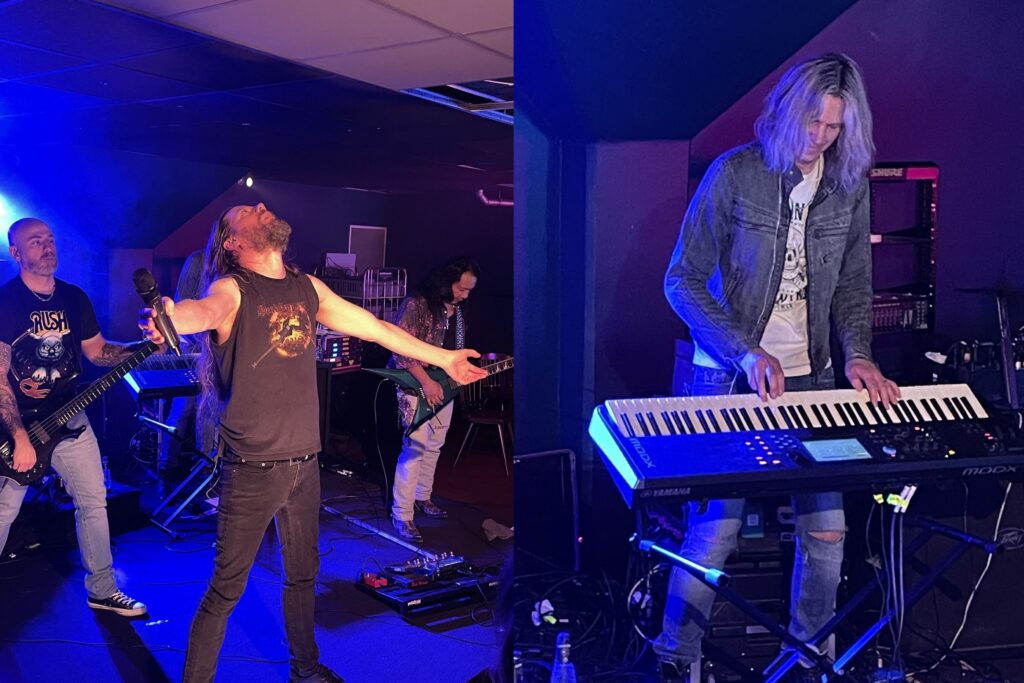
Jag var inne och spanade lite på er Facebook-sida och ni har väl en 60,000 följare drygt. Det är inte så pjåkigt, med tanke på att ni inte har någon som sätter press på er och att ni har varit borta ganska länge.
Jonas: De som är våra fans liksom är extremt trogna och så otroligt tålmodiga egentligen. De har ju stannat med oss hela vägen, liksom även om det har varit långt mellan plattorna, och framför allt de senaste plattorna. Men då har ju impacten blivit ännu större när det väl dyker upp någonting från oss, eftersom varje gång man postar något inlägg eller någonting, då blir ju folk heta på gröten igen.
Lyssnar ni själva någonting på power metal och har ni koll på power metal-scenen idag överhuvudtaget?
Jonas: Extremt lite. Jag lyssnar väl inte så mycket på musik överlag. Visst, när man är på jobbet och sådana grejer, men då lyssnar jag på ofta lite hårdare grejer. Eller krångligare grejer, som Dream Theater eller Cradle Of Filth.
Elias: För mig var det nog de två första Rhapsody-skivorna och sedan så tappade jag lite hela grejen. Men visst, man kollar väl kanske någonting någon gång, men det är väldigt sällan faktiskt.
Jonas: Men det är inte som så att jag slänger på en Stratovarius-platta längre, som var någonting jag lyssnade enormt mycket på. När vi började egentligen, då var det ju det man lyssnade på och det som influerade en hel del, liksom den typen av musik då. Men jag upplever väl att genren har blivit jäkligt utspridd. Det finns väldigt mycket power metal ute nu, känner jag i alla fall. I alla fall via sociala medier liksom.
Elias: Det finns väl mer den här väldigt välproducerade, typ Powerwolf. Förr var det ju mer att, det var välproducerade grejer, men det var inte riktigt den typen av produktioner som var så här väldigt slimmade liksom, och nästan så här studioprojekt, låter det som liksom. Väldigt välgjort.
Om ni själva skulle försöka beskriva. Vad är en typisk Dragonland-låt och vad innehåller den?
Elias: Det är väl ofta så här dramatiskt och symfoniskt i botten. Det är ju mycket det vi har gått på liksom sedan länge. Och oftast är det story-drivet.
Jonas: Just de story-baserade, eller de temaplattorna som vi har, det är väl egentligen den genetiska grunden till vad vi gör. Sedan om man ska ta liksom låtexempel så skulle jag vilja säga, ja, The Black Mare är väl stereotypen av vår typ av power metal egentligen. Just den symfoniska biten tar ju väldigt stor plats.
Er senaste skiva släpptes i oktober 2022. Men ni spelade in den för ungefär tre år sedan. Hur ser ni på den skivan idag, om man säger så? För den är ju inte så där superny längre, även fast den är den senaste.
Elias: Det var ju ett tag sedan man lyssnade på den, alltså på det sättet. Men jag är väldigt nöjd med hur det blev. Det var ju väldigt lång tid mellan plattorna och det kändes ju också som att när det har gått så lång tid så vill man kanske göra någonting som är lite längre också. Skivan är ju ganska lång. Jag är väldigt nöjd med att jobba med Jacob Hansen igen och med produktionen är jag väldigt nöjd med hur det blev i slutändan.
Jonas: Ja, där visste vi ju vad vi skulle få liksom. Vi visste att han visste vad vi ville ha.
Elias: Dels var vi väldigt nöjda med hur Under The Grey Banner blev och när det gått så här typ 10 år, då är det ju klart att då känner man lite att vi måste ändå på något sätt ligga i en fas med det.
Jonas: Jag är nöjd med vad vi valde för story-inriktning. Liksom själva sci-fi-temat fungerar mycket bättre till de här låtarna än vad det hade gjort med hästar, orcher, troll och mithril-svärd. Det känns väl ändå som att vi gjorde det rätt och jag är ju skitnöjd med den plattan också.
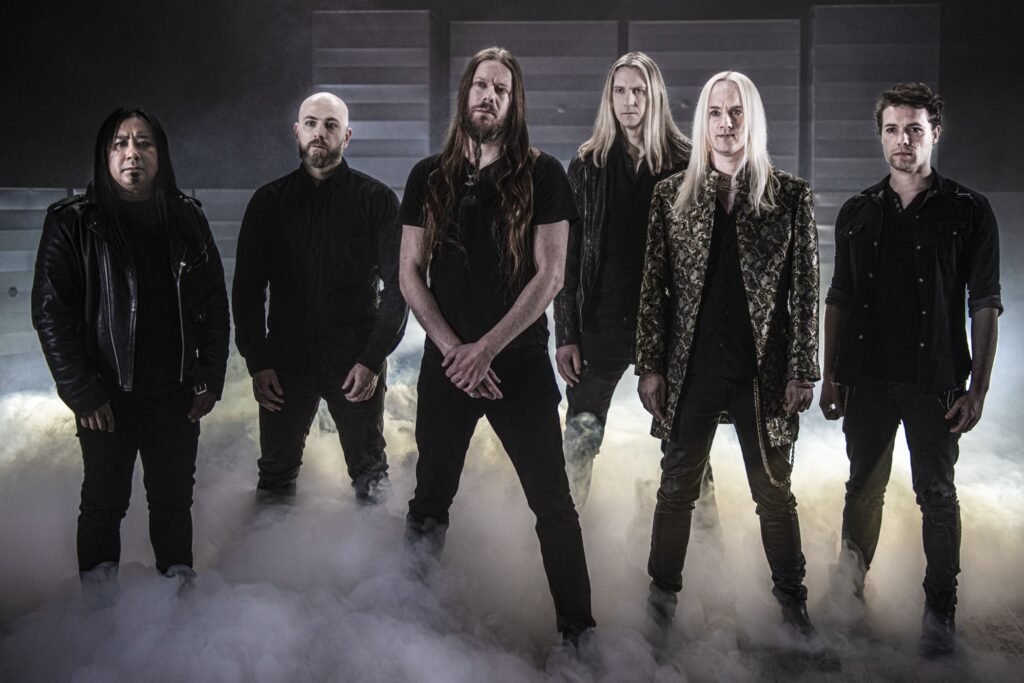
Och som ni har hört hundra gånger förut så var det ungefär elva år mellan plattorna. Kommer det att dröja till 2033 innan vi får se nästa platta?
Elias: Det hoppas vi inte, för vi har skrivit klart hela nya skivan. Det är bara att vi inte har spelat in än. Så skulle det gå elva år hade det varit tragiskt i det här läget.
Textmässigt, hur ser det ut nu inför nästa platta?
Jonas: Oh, det vet jag inte om vi kan avslöja någonting om. Det känns lite för spoiligt med tanke på att det inte ens är inspelat än.
Om vi säger så här: Kommer det att vara ett klart tema eller kommer det att vara lite mer spritt då, utan att gå in exakt på vad?
Jonas: Nä, det är ju det jag inte vill. Jag vill nog inte närma mig det ämnet. Närmare inpå release så kan man göra det. Efter typ en första singel är släppt så kan man nog komma med det. Och ingenting är skrivet i sten heller, så att saker kan ju ändras liksom.
Musikaliskt, kan man tänka sig att det kommer att följa ganska mycket på The Power Of The Nightstar?
Elias: Ah, det är inte så säkert.
Aha, intressant.
Elias: Det är ju fortfarande power metal liksom. Det är inte rock.
Jonas: Och det hörs ju tydligt att det är vi liksom. Det genomsyras av vår typ av sound, eller vad man nu ska kalla det. Så de som har hört oss innan kommer att höra att det är vi fortfarande.
Du nämnde ju Stratovarius, Jonas, och du, Elias, nämnde Rhapsody. Vad fanns det för andra band som ni egentligen tog influenser av?
Jonas: Rhapsody, Sonata Arctica, Stratovarius var det väl. Det var väl de tre framför allt som fick in mig i genren överhuvudtaget. Innan dess så var det ju Maiden, Helloween, lite mer åt det hållet. Men någonstans där så hände det någonting just av det här snabba och supermelodiska. Jag är ju väldigt torsk på synt och keyboard, och det finns ju i sådan musik liksom.
Elias: För mig var det egentligen bara Bal-Sagoth och Cradle Of Filth. Jag gillade inte så mycket power metal egentligen när jag började i bandet. Men vi var en samling goa gubbar, så jag tänkte att ”Det kan man ju ge en chans.”.
Jonas: Och det var ju mer på skoj också, liksom på den tiden i början. Det var ju mer eller mindre planerat för två plattor. Sedan var det förjävla roligt bara, så då, ja, ”Vi hittar på någonting annat då.”, och så fortsatte det.
Vad är det som inspirerar er nu då att göra ytterligare en platta och att skriva musik under de senaste fem åren?
Elias: Det är väl mer att man ser fram emot den här goa känslan när man har gjort klart någonting. Ibland kan det ju vara en väldigt traumatisk och plågsam process att skriva, och framför allt förra gången, när det gått 10 år innan man skulle börja skriva på allvar liksom.
Jonas: Men samtidigt så är det ju jävligt tillfredsställande varje gång när en ny låt börjar ta form.
Elias: Ja, när man väl får till det. Man kan sitta en dag och så känns allt bara värdelöst, och sedan plötsligt får man en idé. Vi skulle kunna skriva en skiva säkert på några månader liksom, men det ska ju kännas som att det är någonting som man hittar en ny infallsvinkel på, och då känns det ju gött liksom.
Jonas: Det måste ju finnas känsla och tanke bakom det man gör också. Vi vill i alla fall inte bara skriva en platta för att släppa en platta. Det funkade ju svinbra på 80-talet med alla de här banden, för det var ett klart och tydligt sound liksom. Men som sagt, vi tycker nog det är värt att det tar längre tid i sådana fall, och att vi själva kan stå för det vi släpper.
Det säger många artister såklart, att det är ju en väldig tillfredsställelse när man står där med en färdig skiva efter ett så långt jobb.
Elias: Ja, det är ju gött när man äntligen har den i handen. Dels att skriva låtarna kan ju, som jag sa, vara lite plågsamt ibland, alltså rent kreativt, och sedan är mixningsprocessen och sådant ju väldigt mycket jobb liksom. Mycket småpill och det drar ut på tiden och så där. Och det är gött när man sedan väl är färdig och säger ”Nu kan vi inte ändra någonting mer. Vi kan inte gå in och pilla här något mer, utan nu är det färdigt.”. Det är en befriande känsla på något sätt också.
Jonas: Ja, extremt tillfredsställande.
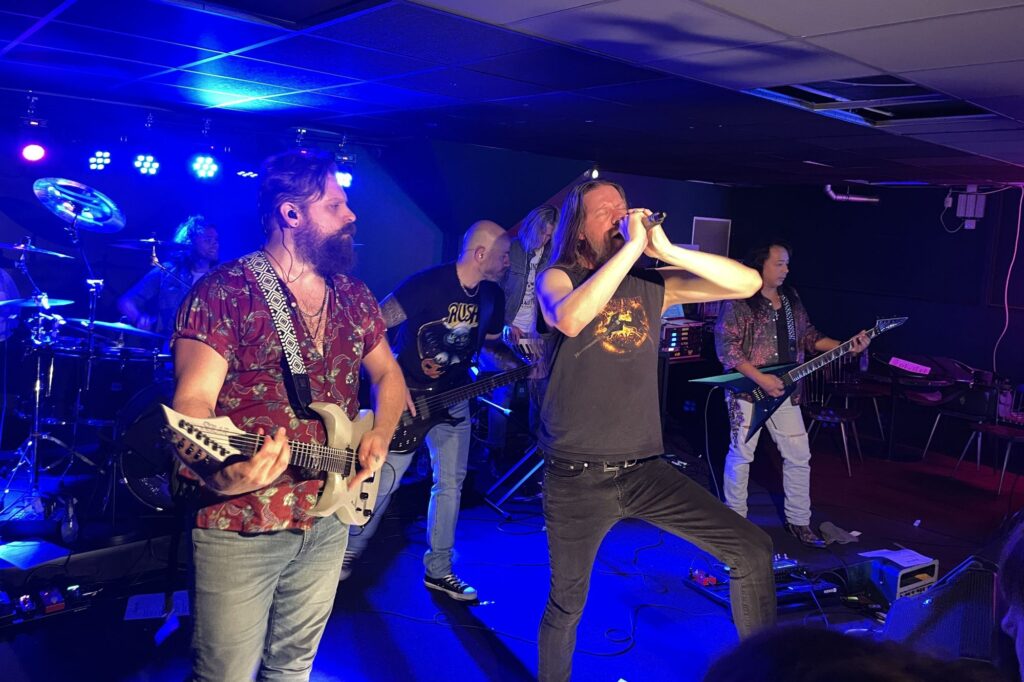
Med det här långa uppehållet och nu ytterligare ett par år in i er karriär efter skivan 2022, hur upplever ni än idag den här skillnaden som har skett i hela musikbranschen? Det har ju svängt från att folk köpte skivor, och sedan kom nedladdning typ i början av er karriär, men sedan tog det en helt annan fart ungefär när ni lade ner och att ingen köper skivor nästan.
Elias: Jag vet inte. Jag har nog inte mycket känsla för det egentligen.
Jonas: Däremot har man ju fått inse och acceptera streaming någonstans. Det är ju det som gäller för de flesta. Men sedan upplever man väl att det har blivit ett litet uppsving på ren fysisk försäljning igen. Det är folk som samlar.
Elias: Ja, CD-skivor är på väg tillbaka har man ju hört lite grann.
Jonas: Ja, precis. Vinyl har ju kommit tillbaka de sista åren också, och nu börjar ju CD komma igen, så folk kanske har tröttnat på den här stream-grejen. Man vill ha grejen stående i en bokhylla hemma.
Elias: Alltså, det enda jag tycker är jobbigt med streaming-grejen lite grann är att när vi släpper en temaplatta liksom, då måste man släppa singlar. Det känns lite fel. Man vill att folk ska få hela grejen på en gång och lyssna från början till slut, men så kan man inte jobba längre, utan singlarna måste ut.
Jonas: Jag var jävligt anti det inför Power Of The Nightstar, liksom med just singlarna. Jag var inte alls förtjust i det. Men efter vi väl gjorde det, då fattade jag liksom ”Okej. Det är därför.”, att det made perfect sense liksom.
Önskar ni någon gång idag att ni ändå hade satsat hårdare på bandet för en 15–20 år sedan, när det begav sig, om jag törs säga det utslitna uttrycket?
Jonas: Det är svårt att säga om vi hade kunnat göra någonting annorlunda egentligen. Vi valde väl kanske inte att inte göra grejerna heller. Men samtidigt, som jag sa tidigare, så är vi ganska lata, så önska och önska. Visst, jag hade väl gärna sett att vi hade varit ute och lirat mer genom åren som har gått, men det är lite svårt att göra någonting åt det nu. Men man får ju se vad framtiden har att bjuda på istället, och se om det blir mer grejer.
Elias: Sedan vet man ju inte, att om vi hade satsat stenhårt, då kanske vi inte hade funnits kvar som band heller. 26 år är en väldigt lång karriär för ett band. Det kan vara svårt att försörja sig på power metal fullt ut och då kanske det ändå inte hade funkat i längden. Så jag är väldigt glad att vi fortfarande finns kvar.
Jonas: Sedan tror jag väl att just den slappa approachen, om man kan uttrycka sig så, som vi har haft, det har ju kanske även gjort att vi har inga eller väldigt få interna konflikter eller någonting. Vi har liksom aldrig haft någon typ av strul på det sättet, utan alla har ju dragit åt samma håll liksom. Visst, någon kan ha kommit med något önskemål som inte går igenom, men då köper man det liksom. Jag tror att om vi hade liksom pushat hårdare så kunde det ha hänt att folk hade tröttnat. Så jag tror nog att vi har gjort rätt, för vår del i alla fall.
Du nämnde orden försörja sig, Elias. Det är ganska få band som ändå kan verkligen försörja sig på sin musikkarriär. När man börjar att starta upp ett band så är det mest för att man tycker att det är kul att lira. Sedan vänder det kanske lite, att ”Man kanske kan göra en karriär av det här.”, men sedan kommer de allra flesta till den här hemska tidpunkten, ”Det här kommer ju aldrig att funka ekonomiskt. Det här kommer ju aldrig att bära sig.”. Har ni någonsin pratat om det här?
Elias: Jag hade nog den känslan när vi skrev Starfall. Då var jag så här ”Det här kommer bli den bästa skivan någonsin. Nu kommer breaket efter det här.”. Vi jobbade ju som idioter med den skivan, jag och Olof då på den tiden. Jag hankade mig fram på Postverket liksom och kände efter de två åren att ”Nä, det här är grymt, men jag tror att här får jag nog hitta någonting annat att göra parallellt.”. (Skrattar)
Jonas: Jag hade aldrig några illusioner på att det skulle vara något man skulle kunna leva på, i och med att genren är så pass nischad som den är. Den är ju jävligt smal egentligen. Ska du kunna leva på det så behöver du spela musik som tilltalar en mycket bredare publik än vad vi gör, om man ska vara krass egentligen. Så att, nä, jag har aldrig känt att ”Okej. Det här kommer jag att leva på nu.”. Även om vi har vetat att man haft en kanonplatta på G så har man ändå känt ”Ja, det blir kul det här. Det kommer att bli bra och det kanske blir några extra kronor i fickan.”. Men jag blir nog kvar på mitt lager ändå liksom.
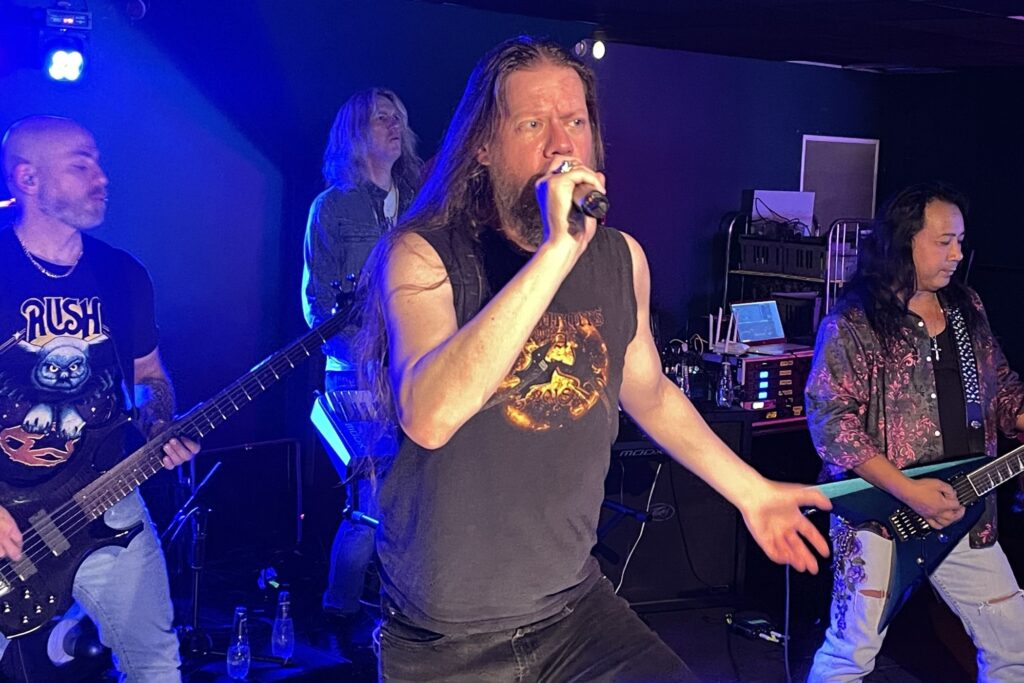
Era familjer, barn, släkt och vänner. Vad tycker de om att ni fortfarande lirar i ett hårdrocksband? Positivt och negativt. Vad säger vänner, släkt och alla till er?
Elias: De tycker att det är kul.
Jonas: Jag har bara positiv push bakifrån, liksom från familj, kompisar och släkt. Det är möjligtvis ungarna som kan tycka att det är lite töntigt liksom. Jag vet att de tycker att det är lite coolt att pappa håller på med sådana grejer och åker runt ibland och spelar. Men samtidigt så gillar de inte musiken, så då tycker de att det är töntigt, på det sättet då.
Elias: Jag får ju mestadels höra de negativa grejerna. (Skrattar)
Jonas: Sedan för min egen del så lirar jag ju med ett annat band och vi spelar väldigt, väldigt mycket, men det gör ju just att de här små breaken man spelar med mitt ”riktiga band” blir så jävla mycket roligare när det väl blir någonting. Som du sa, att vi bara har tre spelningar det här året, men då ser man ju fram emot dem desto mer liksom. Då blir det ju en liten höjdpunkt för året, att köra de här få istället. Jag vet ju inte hur man hade känt och tänkt om vi hade spelat 30 gig det här året. Då kanske man hade varit lite trött och sleten och, kanske inte tappat gnistan, men det hade nog inte känts lika kul.
Men det är en sak som man alltid måste göra innan man spelar några gig. Man måste repa. Hur känns det att repa när man spelar så sällan?
Elias: Själva repningarna, då har man ju lärt sig allting och då sitter det ju för det mesta. Men just när man börjar och ska lära sig låtarna själv igen, det tar ju ett tag. Man är ju dålig på att hålla igång allting om det gått ett år emellan liksom, så då blir det till att öva upp igen och memorera allting och så där. Men det är ju roligt såklart, och det är alltid gött när man väl har träffats och kör några rep liksom.
Jonas: Jag har ju det enklaste jobbet där egentligen. När vi har bestämt en setlista, då lägger jag in den på Spotify igen och går omkring med lurar på jobbet och plöjer igenom så att texterna sitter liksom. Men alla övar ju på sitt håll innan och sedan kör vi ett par rep ihop hemma i Elias studio och nöter tills man känner att ”Det här kommer bli bra.”.
När du lär in låtarna, Elias, är det alltid helt enkelt att hitta rätt ton som du ska spela? Eller kan det vara så här ”Hur fan spelade jag det här?”?
Elias: Ibland får man ju plocka ut grejerna igen och lyssna sedan, ”Vad fan vad detta nu?”. Oftast så är det ju helt nollställt när man börjar, men sedan kommer det tillbaka rätt snabbt när man har kunnat det någon gång. Men visst, det är klart, ibland är det grejer som man får ta ut igen.
Gör du något annat musikmässigt idag, Elias?
Elias: Jag gör ju lite småstudiojobb ibland för band, och lite orkestreringar och sådant. Sedan gjorde jag lite så här synthwave för några år sedan också som jag har släppt ut.
Jonas: Men du har gjort rätt mycket sidogrejer, upplever jag ändå. Mycket gästgrejer.
Elias: Ja, det har varit en del sådant. Nu var det ett tag sedan, men det händer lite grann sådant då och då.
Av Tobbe – Publicerad 1:a april 2025
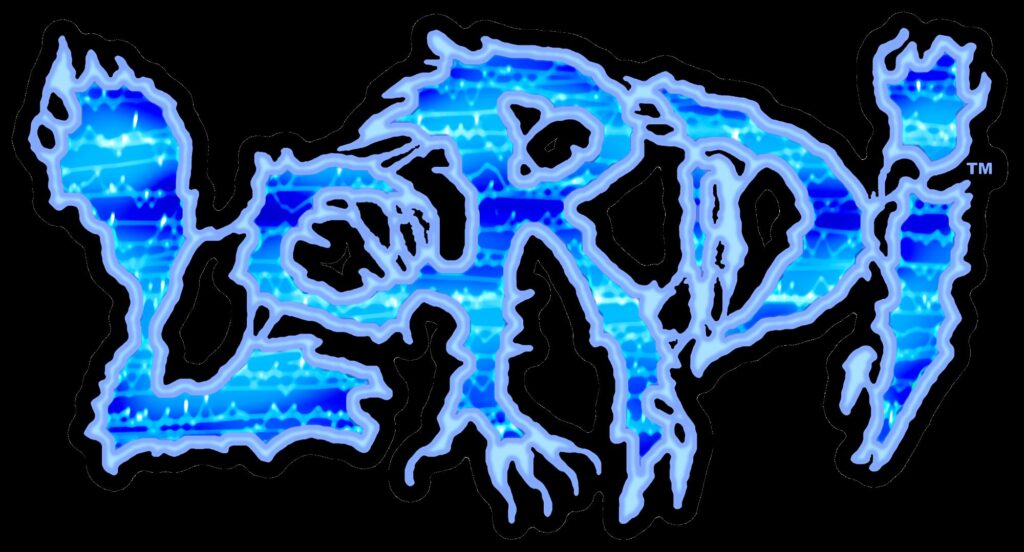
Metal Covenant got on the phone to interview Mr. Lordi about the band’s new making Limited Deadition.
You have made an extraordinary 19 full-length albums now in just over 22 years. That’s a very impressive number of records. And, you know, most bands never even get to that number over their whole career. How come you’re so productive with making records with Lordi?
Because I am. I’m a very productive, very creative personality. I’ve always been like that. I mean, we come up with a new album with every two years. We could come up with one album every year. It wouldn’t be a problem at all. And the reason why we have 19 albums now is because we released seven albums at once during Corona. Because we didn’t have to do anything else. So that was the time to do that, you know. So that’s why we have 19. But basically we’re releasing an album every two years. That’s how the cycle goes for this band. But then again, I don’t think it’s anything that special if you think about the ‘70s. You know, Kiss released an album a year, and sometimes two albums every year in the ‘70s. And in the ‘80s bands were releasing an album a year. No fucking problem there. You know, the world was still the same. But it seems somehow nowadays the music business has gone to that that it’s normal for a band to have, like, a five to a fucking seven-year break between the albums. It’s not natural for me. I’ve been comparing making albums to taking a shit, as it’s not a choice, but it’s something you need to do. You need to take a shit. Most people need to take a shit once a day, some people need to take it every two days, and there are people who take a shit, you know, like two or three times a day. And it’s not a choice. For me, music is the same thing, that it needs to come out. So I need to take a shit. And for me, pretty much, my regularity is around two years. That’s when the shit comes out. Whether you are there to get it or not, the shit will come out somehow. It needs a channel. Because if you keep it in, you explode and you will get sick, you know. And I know it’s a funny comparison, but it works well to compare it like that. And I can even take the shit comparison even further. With these 19 albums we have done under the name of Lordi, we have done quite a lot of different styles of music of rock. You know, we have done disco, and thrash, and hair metal, and pop, and AOR, and all kinds of shit. So you don’t know what kind of shit comes out of you. You know that if you ate some Indian food, the next shit will most likely be watery and wet, and it’s painful to get it out, and it still burns. So, in the same way, if I’m listening to a lot of Pantera and Judas Priest, then probably we will make a more metallic album. But if I’m listening to Kiss’ Crazy Nights, and Poison, and Bon Jovi, then you’ll get an AOR album. It’s as simple as that. The shit will be different depending on what you digest before that.
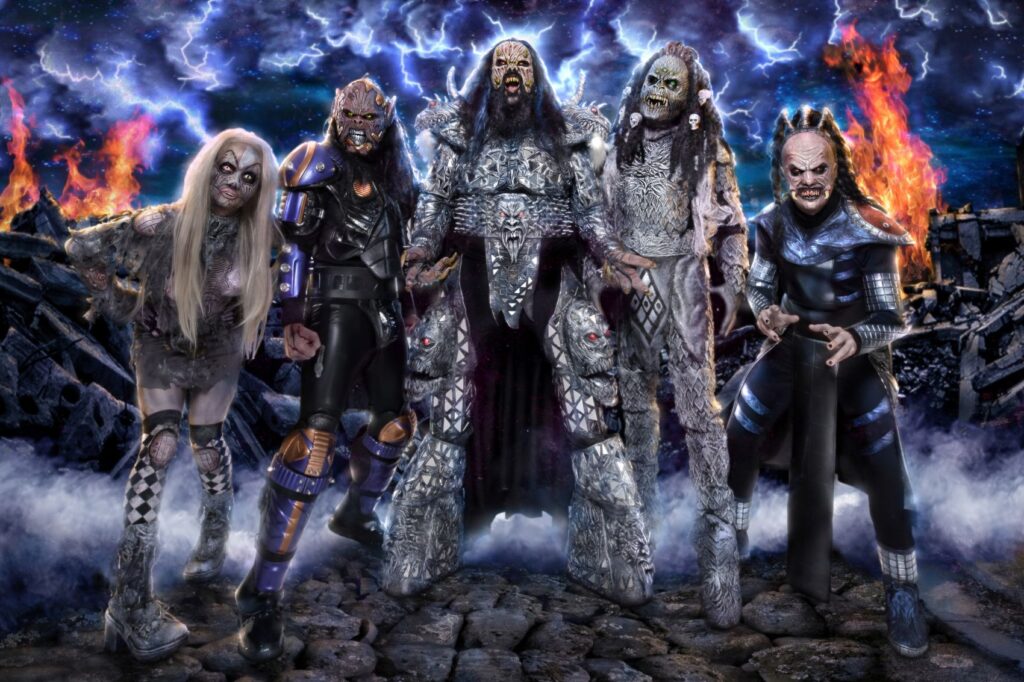
So on this Limited Deadition album, do you see the songs following, like, a specific thread?
No, they don’t. I mean, I think the biography that was written by the label is kind of misleading in a way. I’ve noticed this, you know, during the interviews.
Sorry to interrupt, but I just wanna say that I didn’t read the biography, because that would be cheating. But please, continue.
Good. Good that you didn’t. The album has a very loose theme. It’s a very loose theme of, like, ‘80s oriented TV commercials, and music, and toys, and TV shows, and ads and shit. That’s the very, very, very loose theme of the album. When I started writing the material, all my influences and all my inspiration for this album were all visual in my head. So I had, like, Rubik’s Cube, and neon lights, and shit like that. So how the hell do you write lyrics for that? How do you make a song, you know, when all your goddamn inspiration is basically just visual images in your head? So it was a bit difficult. But yeah, there is some sort of a loose ‘80s TV theme.
Is it anyway pretty easy for you to come up with themes and lyrics for every album made, and still to this album?
It depends. I mean, it depends on the song, really. Sometimes they are really easy, and sometimes they are hard as fuck, you know. Because, you know, I’m a stubborn bastard. I’m a really detailed person, so I want all my lyrics to rhyme, which is difficult sometimes, and I want them to have a certain amount of syllables in the sentences, you know, with the musical line. Because I always write the music first and then the lyrics. So the lyrics need to match the amount of space there is, and shit like that, and like I said, they need to rhyme. So sometimes the story, or the idea, that you have in mind for the song might not be so easy to fit in those already made patterns with the melody. It might be really fucking difficult sometimes. Luckily, I haven’t been doing my lyrics alone for years. I mean, I have my, you know, vocal coach and my co-writer, Tracy Lipp, an American dude, doing it with me. He’s a professional songwriter, so it’s really, really good, and we have been working together with him for 20-something years already. You know, when you have a native speaking American songwriter, and you tell him, “Okay. I’m trying to work with this line.”, then he will, you know, tweak it, and he will find a way how to say what I wanna say if I get into trouble, and many times I do.
In a lot of songs, you have a play of words and phrases. Just like the title of the new album, in fact, Limited Deadition instead of Limited Edition. Was playing with words and phrases always something that was of great interest to you even since you were young?
Yeah, it is. I like to play in words. I always have. I enjoy that. You know, with Lordi, once you open that fucking door, you cannot really close it anymore, because then, if you’re not doing it, I’ll find it, like, lazy. I’d just find it lazy, and it’s just giving up for no reason. I mean, sometimes it’s easy, and sometimes it’s hard as hell, you know, to find the good ones. Sometimes the words come to you, like, really easily, like very, very quickly, and with no pushing. The shit comes out with no problems, and sometimes (Laughs) you have to push the shit, you know, to dump in there on the stool, and sitting like, “Ooh”, and it’s not gonna come out, you know. You know, the shit comparison works for pretty much everything when you’re talking about creativity and productivity. It’s a good comparison, you know.
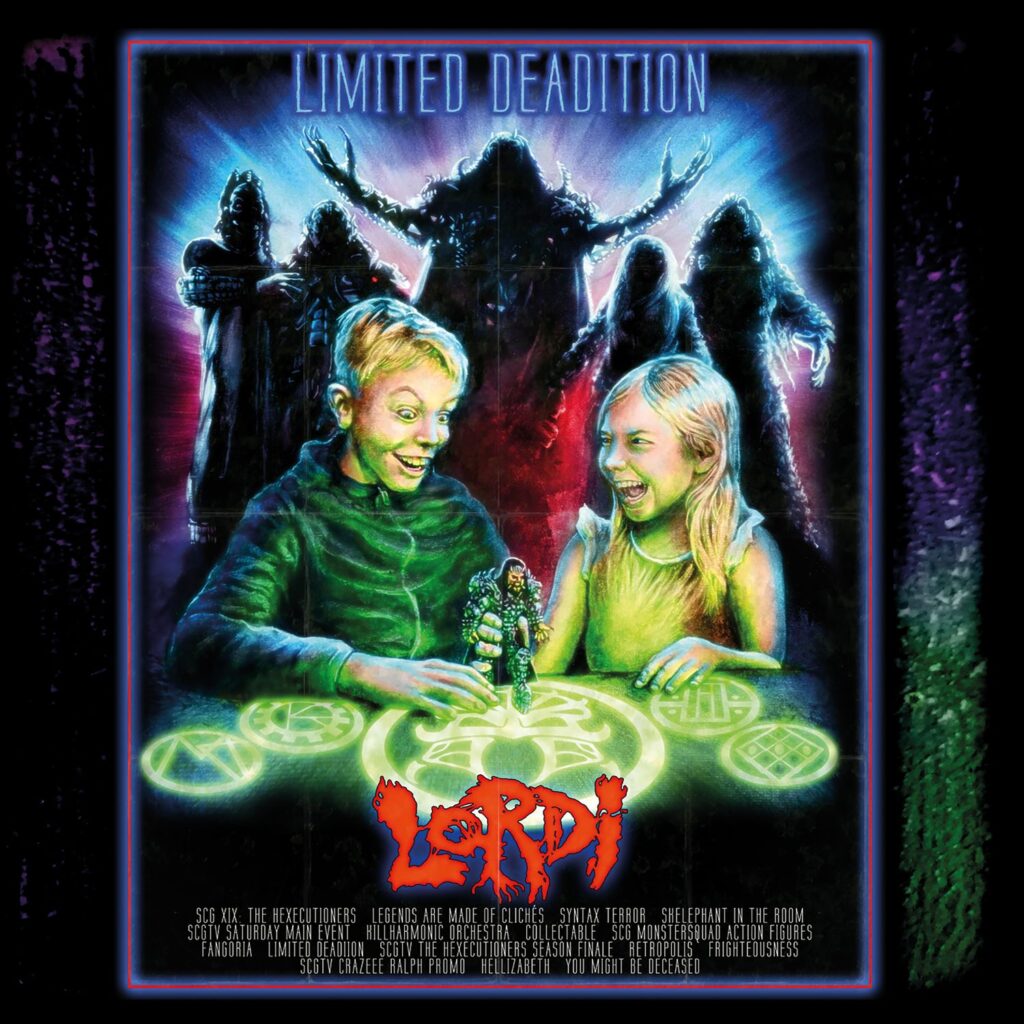
I am right now just checking out the artwork that has those two kids on the front cover. Tell me about this artwork, and why you did decide on a cover like this.
Well, those kids actually are my friend’s son and daughter. As you might know, I always do all the artwork, and I always paint the covers. They’re actual physical paintings, all the Lordi covers. And I wanted to do something that would be reminiscent of an ‘80s toy commercial, like a toy ad. Originally, you know, I had an idea of a much lighter cover, like a white cover or something, like a page from an old magazine or something, but it didn’t work. So then I just decided that I was gonna have the toy commercial, like a Masters Of The Universe toy, or some advert for some board game or something, as a starting point, and then, like, an ‘80s horror movie poster. So it’s like a combination of these things. So it’s just to give kind of like the ‘80s vintage feel to it.
And when you say horror movie, I instantly look at the band in the background, which makes it even more look like a horror movie, because you really can’t see what it is unless you know what it is.
And that’s exactly why the band there in the background is just like in the shadows, because it wouldn’t have worked as a movie poster if they would be all visible, you know.
To what extent do you personally take the decisions on a musical level in the band? Do you do it to 100 percent yourself?
No. We have a pretty democratic community within the band, but then again, I am a dictator also. I have the last word. There’s not a thing that will be done on the album without my approval. Of course, if all the other four members are telling me that, “Listen, dude. It’s a shitty idea. It doesn’t sound good. This is shitty.”, I’m not going to fight them ‘til the death. But mainly, the thing is that when I do the demos, and I do the demos on my own first, and I spread them around the band, it’s a very democratic choosing process, because I always write more than is on the album, and usually like double the amount. On some albums we have had 60 songs that I have demoed, and then we only use 10 for the album. So it’s always democratic in a way, but if I really want some song on the album, it’s definitely going to go there, for sure. And also if the rest of the band really wants a song there that I don’t want, we’re going to put it there, because, you know, we’re kind to each other. (Laughs)
As you write such a great amount of songs, have you ever been thinking about writing songs for other bands or other people as well?
I have, and I even used to be an in-house writer for my publisher, Warner Music. But the problem is that I don’t have time. I’m loaded 24/7. I really don’t have time for that. You know, all my time goes into this band, and that is the problem. I did write some songs that ended up on some Finnish artists’ albums. The problem is that I don’t really have time to write anything extra. It has to be close to 1,000 unreleased Lordi songs, the demos that have been made over the years. There are probably 900 songs that didn’t make it to the albums. If somebody asks, “Hey. Can I use some unused demo and have a song?”, I go, “But it sounds like Lordi…”. That’s the problem, usually. Well, it is a problem, “…unless you want your song to sound exactly like Lordi.”. (Laughs) So that is a good thing. But with demos also, because it’s me singing them with my Lordi voice, because those songs were supposed to be on a Lordi record, and then if you give them away, and somebody else listens to it, it sounds so much like Lordi that it’s kind of hard for them to imagine how it would sound like with a normal singer.
So when you write all these songs, and especially now for the new album, can you describe how you generally start with a song until it’s, like, a finished song?
There are actually quite a few methods that I use. Most of the time, I set my mood to, “Okay. Now it’s songwriting time.”, and that opens up the radio channel in my head. I have to be in a happy mood. You know, the whole fucking melancholic thing, or sadness, don’t work for me at all. I don’t have to be depressed. I have to be in a very happy and upbeat mood. And then I’m walking my dog, or many times I’m watching a movie or something. I’m thinking in my head the whole time, and then all of a sudden, something, a melody pops up. I’m like jamming in my head, and all of a sudden, a little melody pops up, and I go, “All right, that’s cool, okay.”. And many times I have written the full song, with the riff, to the verse, to the pre-chorus, to the chorus, and everything, in my head, even before I touch the guitar or the keyboards. So I mean, the song is written and finished in my head, so then I just have to learn it in real life. That’s one way that I do a lot. Mostly it’s just like a part of a melody or something like that, and sometimes I might just take some word or something, you know, like “Maximum taste, no sugar.”, so I can, like, (Sings) “Maximum taste, no sugar.”. So it’s like, “Oh, that sounds cool.”. And already, when I just said that right now, like, (Sings the phrase again) “Maximum taste, no sugar.”, that kind of like writes the whole song in my head. It’s already written. I know how it goes from there. (Hums a main riff) I have no shame, and I have no filter, so I’m like, “Whatever comes out, that’s what I’ll do.”. So I’m like free-riding the whole time. You know, whatever comes out, I’ll do, and that’s why there are so many songs. That’s many times how I do it. There are also other methods that I use, like for example, I might decide that I wanna do a song in the vein or in the style of this and that, you know. Okay, a good example on this new album: There’s the song called Killharmonic Orchestra, and I told Kone, our guitar player, who brings a lot of riffs, you know, all the time, “I wanna place an order for you, dude. Write me your version of the riff from Ozzy Osbourne’s Bark At The Moon.”, and he said, “Okay.”, and next day he says, “Okay. This is my version of Bark At The Moon.”. And that’s the main riff in Killharmonic Orchestra. Because I just wanted to experiment that with him, that, “Can he do it the same way that I do?”. So if I’m thinking that I wanna do a song that sounds like… whatever, then I’ll just do it. I’ll learn the chords. I’ll check how the song goes in general, and then I just jam it away from that, you know, by keeping the same chords. So then you have a little bit of the same feeling as the desired choice, you know.
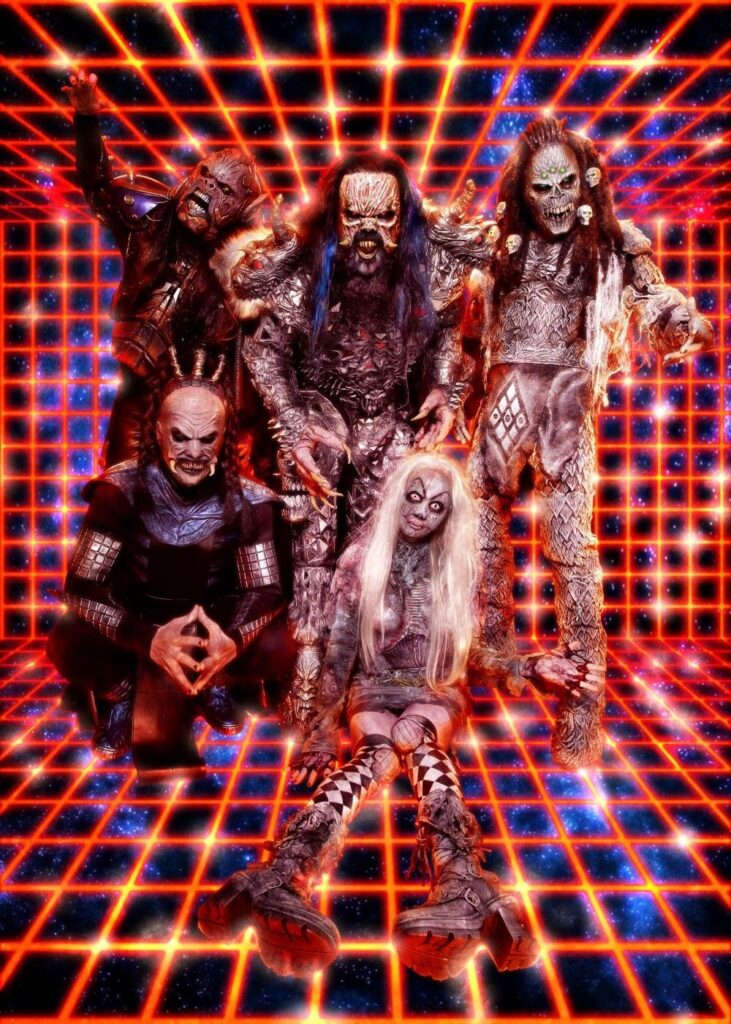
You mentioned that if you had listened to Judas Priest there would be more metallic songs, and if you had listened to Bon Jovi there would be an AOR album. So what do you hear now musically on this new album?
It’s pretty soft, AOR-ish hair metal. The album came out softer. The shit came out, you know, softer than I thought. The original intention was to make the album a little bit harder than the previous one, Screem Writers Guild. That was the goal, and I don’t think actually we succeeded on that. All the harder songs, they actually were left out in the end, you know, in the selection process. But that was the thing, that we would do the same style, but just speed up the tempos a little bit, and just a tiny bit more metal. With that being said, I know that in two years we will probably come up with the next studio album, as it has been all the time in the two-year cycle of Lordi, and probably that one will be much more metal than this one. I’m pretty sure of that. A little bit darker, yeah.
I remember that I bought your first album, Get Heavy, when it was new, and I thought it was like a breath of fresh air. So, what kind of development do you personally see in this long time since Get Heavy was out?
Not much. (Laughs) I see some evolution. But mainly I would say that it comes from two things. One thing is: It comes from that the band has a much more skilled line-up now than it had during Get Heavy. And then over the years when there are new players joining, and others leaving, every time we’ve gotten someone better, you know. So now we are in the situation where the skill set of the band is quite high. There were days when Kita, our first drummer, was still in the band, that we couldn’t do any songs with the double kick drum, because he couldn’t do that. So we didn’t do that. I was still writing those songs with double kick drums, even though knowing that it would not make it to the album, because Kita, with all due respect, couldn’t play that. So we didn’t do those, and stuff like that. Same thing with Amen, when we fired him, and Kone came to replace him, “Now we have a guy who can play anything.”. So it’s like, “Okay. Another lock has been opened for my writing.”. The other thing that has made things evolve is that I’ve been writing so much. It’s been like 20-something years now. So practice makes a champion, you know. The things are much easier to do. I’ve never been struggling with writing songs or anything like that, but now it’s like even easier. It’s more flowing, because you do it a lot, and then you get better at it. The more you do, the better you get.
Lordi has been putting out records for well over 20 years now. In what ways have you personally been affected by how the music industry has changed over the years?
Well, digitalization is the root of all evil. You know, it started slowly, but when it hit over the music business, it hit hard. And the music business wasn’t ready. And I still feel grudge against that. You know, if I get angry at something, I will never recover from that. I will never forgive. I mean, there are so many levels on this shit. I think that the whole streaming of music, the whole not paying the artists that is there, the whole downfall of the physical albums, all that, it’s just because of fucking digitalization and internet, and then later on social media. And I refuse to be part of that. I have to be, but in my personal life I’m not. I have never, for example, been on social media, for a second in my life. I’ve never had Facebook. Never been on Facebook, never been on Instagram, never been on any of that shit, and I will never fucking do it. I don’t even read my fucking e-mails, unless somebody calls me and tells me that, “Hey. You have an e-mail. Go read your e-mails.”. And all my bills still come on paper to me. I pay extra for the companies to send me paper bills.
By Tobbe – Published March 20th, 2025
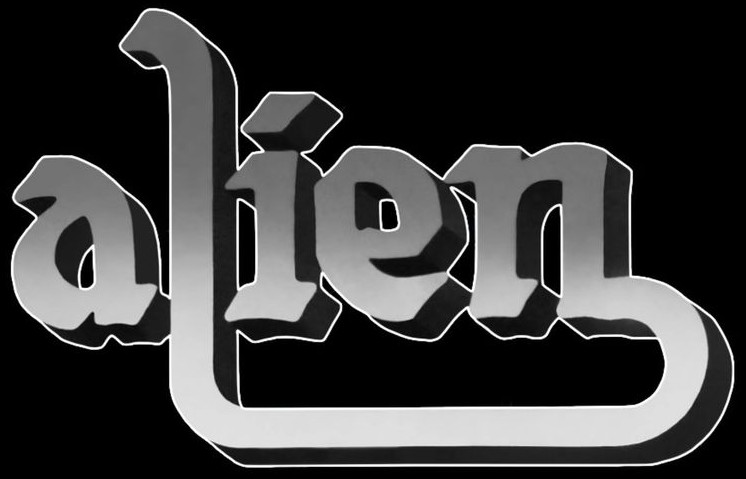
Metal Covenant åkte hem till Alien-gitarristen Tony Borg i Stockholm för ett långt samtal bland annat om nya plattan When Yesterday Comes Around, hans tuffa ungdom och bandets tidiga dagar på 80-talet.
Eftersom min kompis Micke är bekant med Tony sedan tidigare genom deras tennis så var Micke med på plats och eftersom han kom med några instick väljer jag att inkludera dem för att behålla flytet genom intervjun när den nu hamnar som text.
Det har gått nästan fem år sedan Into The Future släpptes. Vi har gått igenom en pandemi, okej, men vad gjorde ändå att det tog så pass lång tid som fem år?
Ja, alltså, det var ju så här att luften gick lite ur under pandemin. Men det var lite annat också. Jag opererade mig i min häl, min tennishäl, så det var gips ett halvår. Och då var det så att under den tiden så tänkte vi så här att ”Nu har vi gjort en sådan här platta som är lite mer metal-inspirerad.”. Vi ville göra en sådan platta. Vi hade haft kontakt med Niclas Engelin, för jag ville liksom förnya bandets sound helt enkelt. Så då tänkte vi så här att ”Då försöker vi ta oss tillbaka igen till våra rötter och se hur det känns.” och då stötte vi på en kille, Magnus från Catapult, som tyckte att vi skulle göra en platta med bara gamla 80-talskompositioner som inte vi själva hade skrivit. Och då så fick vi 40 låtar från honom att välja på. Så vi valde ut 15 av dem och gjorde demos på. De demosarna blev bra. Vi fick erbjudande från Frontiers, bland andra, att släppa de här. Det var också Jörgen Holmstedt, med Magnus från Catapult, som satt här, där ni sitter nu, och vi satt och lyssnade på våra demos. Det tog ju ett halvår att spela in dem. Det var 2023. Då sa vi så här ”Nej. Fan, vi skiter i det här, för det känns ju som att vi är ett coverband litegrann.”. Det var bara för någon slags produktinställning. Och då säger Jim så här till mig att ”Äh, vi tar ett break.” och ”Ja det håller jag med om.”, men så säger han ”Men ska vi göra en ny platta, då måste vi sätta det, Tony, och ta det tillbaka till 80-tals-feelingen. Börja spela utifrån ditt hjärta, som du själv ville, och inte bara försöka göra någonting som alla andra vill.”. –”Ja, det har du har fan rätt i alltså.”, sa jag. Så vi tackade nej då. Magnus och Jörgen tänkte ”Vad fan håller han på med?”. Vi hade ändå hållit på ett halvår med det här. Så att jag satte mig faktiskt sommaren 2023 och bara lyssnade på gamla Dio, Whitesnake, Deep Purple, Rainbow, Genesis, Journey och lite annat som man gillade. Men mest Purple, Whitesnake och Rainbow. Och bara matade, precis som att det var det enda som fanns som gick att lyssna på. Och sedan gick jag ner i studion och skrev åtta låtar på ett par dagar bara. Alltså själva grunden till låtar. Och sedan ringde jag upp Jim då och sa ”Hej Jim. Jag har fan fått upp lite låtar igen. Vad tycker du?”. – ”Ja, fan vad intressant.”, sa han. Och då började han och jag att jobba ihop, för vi jobbar alltid väldigt, väldigt bra ihop. Och då sa han ”Tony. Ska du verkligen inte ha ett stick på den här låten?” – ”Ja, har du någonting att komma med då?” – ”Jo, det här skulle kunna vara bra.”, säger han. Så på det sättet så fick vi ihop låtarna då. Och sedan hade jag någon refräng så jag tyckte ”Det här är en liten cool textgrej. Kan du inte använda den?” – ”Ja, kanske.”, säger han, och så gör han en text och så där. Så håller vi på så. Och då var det så att två låtar av de första låtarna behöll vi trots allt, och det var då If Love Is War och Strange Way, för de tyckte vi ändå hade blivit bra, så där tänkte vi ”De behåller vi.”. Men de låg lite i den stilen som vi kände att vi ändå liksom skulle kunna stå ut med och så. Och sedan då så skulle ju allting göras i ordning, och då gjorde vi så att då kom Tobbe upp till mig och repade på trummorna och så fick han med sig allting och så gick vi in och spelade in alla trummor och alla gitarrer i februari. Och sedan jobbade vi med sången i Göteborg och resten här, i den här studion. Sedan tillbaka igen till Nox-studion, som ligger ute i Järfälla. Och så mixade vi. Så i maj så var det mixat och klart. Och då är det så att nu för tiden så jobbar man ju fram en master och sedan får skivbolagen buda. Så vi fick alltså bud från 10 skivbolag som ville ge ut. Och det var ju jävligt kul. Vansinnigt roligt. Men vi tänkte så här att ”Nu ska vi inte springa på de största elefanterna.”, utan vi valde en lite mindre elefant, ett tyskt bolag, Pride & Joy, med en person som heter Birgitt (Schwanke), för hon är ju den som alltid svarar på mejl, så ”Hej Birgitt. Hur är läget?” och fem minuter senare ”Jo tack, det är bra.”. För ett sådant skivbolag kände vi ”Det är precis vad vi vill ha.”. De flesta av våra plattor ligger på Warner, som det är nu, och de är som de är de här stora bolagen. Men vi fick alltså från Frontiers och vi hade erbjudande från Silver Lining. Men det kunde gå en vecka innan de hörde av sig. Du vet, allt det här. Vi kände ”Vi orkar inte med det här, utan vi vill ha raka rör.”, så att därför fick Birgitt ta det trots att hon inte var lika stor. Så att så tänker vi. Man har blivit klok med åren. Och i samband med det då så fick vi i somras erbjudande från Sweden Rock att spela. Så vi kommer att spela på stora scenen på onsdagen, den första kvällen. Så att då har ju tiden gått alltså. Så det var alltså sommaren 2023 som man började att skriva, och så går hela året, och så satt vi med skivbolag. Vi satt ju i en jävla massa möten med skivbolagen. Man var ju helt slut efter det. Vissa auktoritära också. Vissa skäller ju nästan ut en för att man inte säger ja med en gång. Alltså, jag kan inte säga namn, men det finns vissa som är helt dumma i huvudet, och då gäller det bara att backa snyggt ur. Och så har hösten gått nu, och nu ska vi repa med två Stockholmsmusiker, en basist och en keyboardist, och så kommer Jim och Tobbe upp. Så att, ja, det var väl ungefär vad man har gjort då sedan dess.
Micke: Vilka är de två som ska vara med? Är det några vi vet om, eller är de okända?
Basisten heter Fredrik Karnell. Han spelar med Secret Service just nu. Och Joel Selsfors heter keyboardisten. Han har inget fast band, men han är med oss nu och han har varit med på plattan och så där. Det är de två som hänger med. Och på vissa gig så kommer vi ha med min dotter, som heter Kajsa Borg. Hon var med på Mello den 22:a februari. Hon sjöng med det där countrybandet som inte gick vidare. (Tennessee Tears) Och Jonathan Jaarnek. Det är Towe Jaarneks son. Så de två är med och körar på plattan. Så de kommer vara med oss på Sweden Rock och på några andra ställen, bakom då, så att säga, så det blir bra stämsång också.
Ni har ju ingen officiell basist. Så jag tänkte fråga dig. Hur mycket av basen har du själv lagt på den här plattan?
Alltså, när vi gör våra demos så gör vi basen. Men Fredrik, han är grym basist. Han gör det så jävla bra, så att jag är ju ett skämt som basist jämfört med honom. Så han har lyssnat in sig lite på vad jag har gjort, men sedan har han ju lagt till liksom dubbelt så mycket själv. Vi la basen på Nox-studion också faktiskt, för det passade bäst att vara där och göra det. Men han satt ju hela plattan rakt av i princip alltså. Det var inte många gånger jag fick bryta. Så han är stensäker alltså. Så honom ska vi repa med nu då.
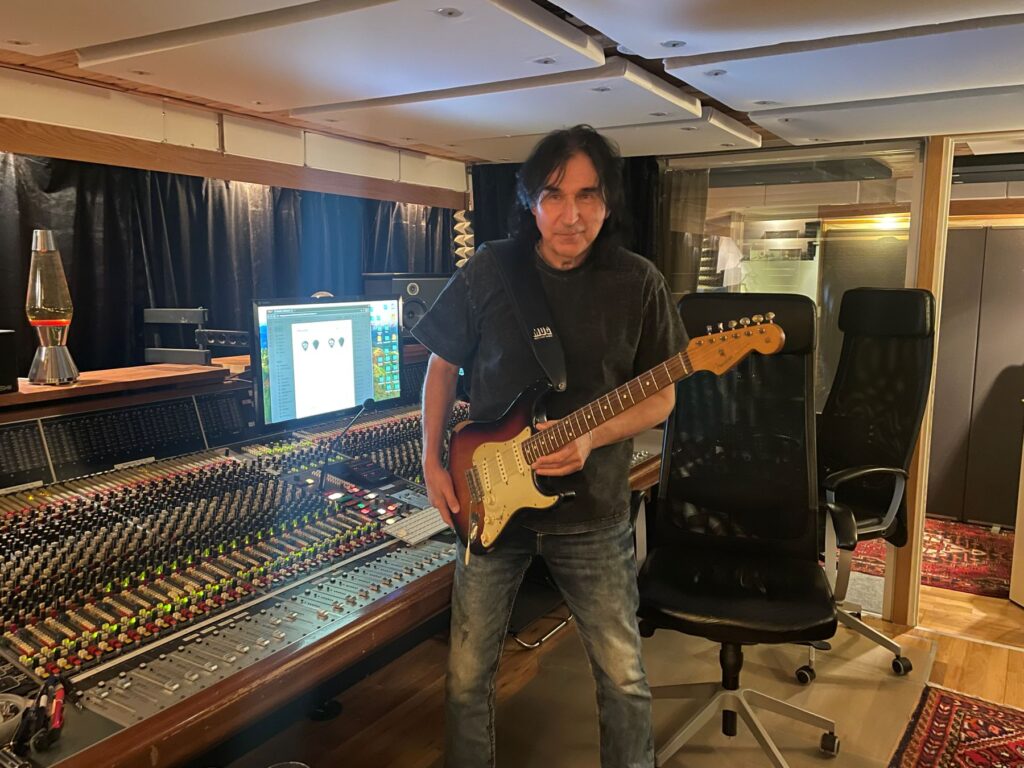
Du nämnde som inspiration att du lyssnade mycket på de gamla klassiska banden. Det kickade ju uppenbarligen igång dig, men finns det något annat som kan kicka igång dig till att skriva nya låtar eller att komma igång med en ny platta?
Alltså, jag tycker så här: att det som inspirerar är att i min ålder också visa att man fortfarande kan leverera. För det är också att efter man har fyllt 50 så kan det finnas människor som nästan ger upp, så att säga, för att de tycker att ”Nämen, nu har jag gjort mitt.”. Man drar sig tillbaka och så. Och det stämmer inte alls för mig. Nu kan jag spela gitarr bättre än någonsin, och ha bra koll och förstå saker, och är framför allt frisk. Jag opererade mig i höstas och det var ju också en sådan här grej, att ”Kan man fixa det så kan man fixa resten också.”. Jag tycker det är kul att visa att man i min ålder fortfarande är fit for fight och det sporrar mig att prestera bättre än vad förväntningarna är. Och jag får ju jobba också med Jim, som är en fantastisk sångare. Han är ju världsklass, Jim Jidhed. Det också inspirerar mig, att få jobba med honom. Alltså, att få jobba med det bästa folket. Så att där har du väl några faktorer då. Vad jag har nu är ju tennisen, jag har musiken, jag har min studio här och det är min lilla cave som jag kan gå till. Sedan har jag min familj, det är min hund, det är min fru, som jag gillar jättemycket, som backar mig 100. Sedan har jag mina två barn, som också är i musikbranschen.
Men det tar ju jäkligt mycket tid att göra en hel skiva, och sedan har du allt det här andra att göra också. Så du verkar vara en ganska upptagen man.
Jag är faktiskt en ganska upptagen man. Alltså det är ju så att det är ju jättemycket. Alltså, det är ett jätteprojekt, och jag drar också projektet, tillsammans med Jim då. Det är vi som liksom drar i det. Alltså, det är ungefär som en sak man måste göra. Varför går folk upp på Mount Everest liksom? Varför? Jo, man kan ha filmkamera med sig så man kan ta liksom en film. Ja, vad händer sedan då? Ja, det vet man inte, men det var det man ville göra och det var det man måste göra för att klara psyket att orka med sig själv. Jag vet ju också att tennisen är också något annat. Man står och nöter på den där jävla serven och man blir aldrig klar. Och sedan när man tycker man är precis som mest klar så går det ju skitdåligt. Det där är ju också en sådan här omöjlig grej som man aldrig blir klar med. Och det är också en sådan här åldersgrej, att man vill också vara duktig även om man är i en annan ålder än 20. Och det är det som driver en framåt kanske, att man går ner och tränar trots att det är tråkigt. Lite så är det med musiken också. Det finns någonting annat också. Det här är ett på-riktigt-svar: Min barndom var ju utmanande. Skilsmässobarn, uppväxt hos mormor och morfar, som var fantastiska föräldrar, men det var inte riktiga föräldrarna. Och skolan var jättedålig för mig. Jag tröttnade så det bara stänkte om det. Jag satt hellre hemma och trimmade moppen. Där jag bodde då, i Västra Frölunda, Högsbo heter det. Det var otroligt stökigt, förutom att vi sköt inte varandra. Men det fanns en kille som hette Jouni och han slog ihjäl ett fyllo av någon jävla anledning. Det är ju också en grej, att när jag då av en anledning valde bort att inte hänga med i det här gänget så var det för att jag hade träffat en kille som hette Roy, som var en fantastisk gitarrist, som jag blev jätteinspirerad av, och helt plötsligt så fanns det en meningsfullhet med livet tyckte jag då när jag var tonåring. Helt plötsligt så bara ”Pang! Det är det här jag vill göra.”. Så jag tränade ju 10 timmar om dagen. Jag låg och drömde på nätterna att jag kunde spela och när jag vaknade på morgonen så blev jag skitsne för att jag hade drömt det. Och jag hade precis soundet i huvudet, hur det skulle låta och allting. Det där finns fortfarande kvar. Alltså, det där är inget som man kommer över, utan den motivationen jag fick då, den kan jag också ta fram idag. Alltså, i den skolan som jag gick i umgicks jag med jätteduktiga människor. Den ena killen har varit VD på massa företag. Han var jätteduktig. Det handlade inte om socialt dåligt, utan det var bara att skolan var så jävla dålig. Den erbjöd mig så lite. Och då hittade jag det här. Men du vet, Västra Frölunda på den tiden, eller där vi bodde i Högsbo, alltså dagligen så stal man motorcyklar och åkte runt på, och dagligen så var det ju folk som snodde bilar. De sniffade thinner och rökte brass. Alltså, allt fanns. Hela liksom smörgåsbordet med dåliga grejer fanns. Jag var ingen drivande person, men jag hängde med äldre personer som ofta försöker visa vägen, och visade dåliga vägar. Och då kommer en sådan här grej, ”Pang!”. Det kom ju ifrån himlen liksom, att man får träffa en sådan här kille som Roy som spelar gitarr så jävla bra. Då sitter man ju bara som en jävla Rembrandt i det träsket. Så det var bara att sälja allt man hade för att åka och köpa instrument. Och på den vägen är det. Det är en resa man startar. Man är på väg alltså. Sedan har det gått olika bra och olika dåligt genom livet och så, och det får man väl ta. Det ingår. Det är ungefär som att spela tennis. Vissa gånger så känner man ju bara ”Fy fan alltså. Jag skäms.” och vissa gånger känner man att alla servar sitter på linjen. Och lite grann så är det i musiken också. För det är ju också en bransch. Alltså, musiken är ju en bransch. Och det är en bransch som ser en med olika ögon beroende på när det är. Så exempelvis när vi slog igenom med Alien så var det ju ”Den fantastiska gitarristen i världsklass från Göteborg.”, men ”Va fan. Jag har ju varit världsklass i 10 år.”. Men branschen ser på musiker och på det man gör med olika ögon. Det beror på när det sker. Så är det.
Först pratade vi om den här cover-skivan som aldrig blev av, och sedan pratade vi om den skivan som det blev nu, som har klar inspiration från tidig rock- eller hårdrocksmusik. Är det jäkligt svårt att bestämma var man vill ta en skiva när man börjar?
Ja, alltså, det gäller ju att förstå att man är ingen maskin. Man måste liksom förstå att man kan sitta liksom bara dag ut och dag in och så kommer det inget som man gillar. Alltså, jag kan inte förlika mig med dem som säger att ”Nu ska jag gå till arbetet och skriva en låt.”. Björn och Benny har snackat om det mycket att de börjar 10 och slutar 18. Då sitter de och jobbar. Alltså, det är ingenting för mig, utan det kan gå liksom två år utan att jag skriver en låt, för jag kan inte se musik som en arbetsgrej, utan det är ett verk som kommer inifrån. Man föder ju verket liksom och det vet man aldrig när det kommer. Men Jim sa till mig ”Men Tony, ska det bli en ny skiva så får du nog fan skärpa dig alltså.”. Ja, vad gör man då liksom? Jo, då måste man försöka hitta inspiration och hitta tillbaka igen till en gammal värdegrund liksom, där man skiter i vilken tid man lever i. Och sedan har vi ju ändå jobbat med moderna ljud. Det hör du ju på skivan. Så det är inte så att den låter liksom ’85 eller så där. Man gör det man gör fast i den här tiden då. Men det lättaste är ju att hitta ett sound sedan, på något sätt, och hitta låtar. Det blir ingen skiva utan de låtarna liksom, och ingen annan kunde göra dem heller till oss, så vi är tvungna att göra dem själva liksom. Så är det ju.
Du sa att Jim och Tobbe hade kommit upp hit lite, men hur mycket spelar du in ensam här innan någon annan ens vet vad du gör?
Ja, det är timmar alltså. Alltså, en låt kan ju ta flera dagar. Man sitter och filar på den innan jag skickar den till Jim. Man sitter och filar, och så känner man ”Ah, vad fan. Jag måste nog göra så här istället. Jamen, det här är mycket bättre.”. Du vet, man filar på riffet. Man vårdar på något sätt liksom. Som exempelvis med I Belong To The Rain, där är ett riff som jag kör som är väldigt inspirerat från Rainbow och Ritchie Blackmore. Men det är inte exakt likadant, utan det är arrangerat så att det passar Alien bra, så att man liksom har fått in det i vår stil. Och hittar man det riffet, då har man kommit långt. Ett riff är liksom fundamentet på något sätt. Ungefär som melodin som Europe har på The Final Countdown. Alltså, hittar man någonting så skapar man runt det sedan. Så sedan har Jim och jag lagt ner, precis som Björn och Benny, det där kringjobbet. Det kan man göra liksom mellan 9 och 18 om man vill, för kringjobbet är mer hantverk bara, men att göra låten är någonting annat.
Micke: Är det inte lätt att återfalla i samma riff?
Jo, jättelätt. Och det är det som är den stora belastningen för musiker som skriver egen musik. Man har ju bara sin egen källa liksom, och man gillar ju bara det man gillar. Man kan inte bara skriva någon annans låtar helt plötsligt liksom. Så därför finns det ju en risk att man kopierar sig själv. Men det är okej om man snor av sig själv, eller hur? Man kan inte stämma sig själv i alla fall. Det är värre om man snor av någon annan. (Skrattar) Men visst, det är en risk där. Det är det.
Det räcker inte med att du ska vara en bra gitarrist. Det svåraste är ju att göra bra låtar. Du kan vara en hur bra gitarrist som helst, men kan du inte skriva bra låtar, då är det svårt att bli hörd.
För låtarna måste finnas först. Det är det första som måste vara. Och det spelar ingen roll hur duktig musiker eller sångare du är. Man kan inte spela en dålig låt så att den blir bra. Den måste vara bra från början. Men sedan kan den bli bättre för att man spelar den bra. (Skrattar)
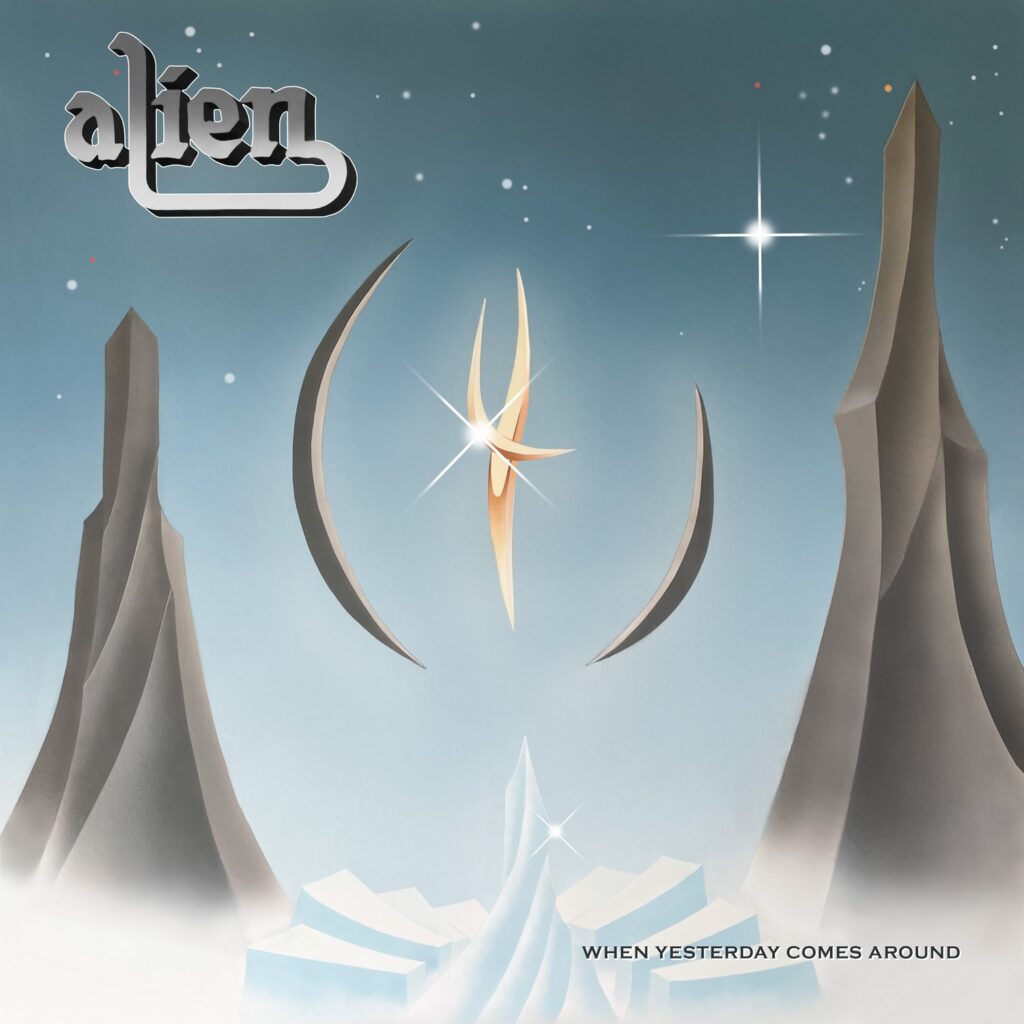
Kan du berätta lite hur du ser på skivomslaget? Jag kan ju säga att jag ser lite modernt, men ändå lite gammalt i det.
Ja, just det. Jag ska hämta det.
Tony går och hämtar ett exemplar av CD:n, överräcker det till mig och sätter sig sedan ner på sin stol igen.
Micke: Den är inte helt olik den första.
Och vet du varför? Det är samma konstnär. Anders Holmberg heter han. Alltså, första plattan vi gjorde, då frågade jag honom ”Anders. Har du någon schysst målning som du har gjort, som vi skulle kunna få?”. Så hade han lite grejer han hade gjort, och då fastnade vi för en av dem. Så det var en tavla innan. Den tavlan har jag här faktiskt. Den finns på riktigt. Det blev att vi tog den tavlan till vårt omslag på första plattan. För vi ville ha någonting annat än det som fanns då. Vi tyckte den passade bra för oss liksom. Man ska inte kunna identifiera oss med en viss genre, utan vi ska mer vara Alien. Vi ska vara främlingar. Och nu kände vi så här ”Nu vill vi knyta ihop säcken.”, så vi ringde Anders igen lite innan plattan var klar. Det var i god tid innan vi skulle ha omslaget klart. Och då sa vi till honom ”Anders. Har du fler målningar?” – ”Nä, jag har inte gjort så mycket sådant där.” – ”Nämen, nu är det fan dags att göra någonting. Och vi vill inte ha samma omslag, men du får jättegärna hitta på någonting annat. Det ska finnas en grej i mitten som ska symbolisera något ljus. Man ska se liksom någonting i mitten och man ska kunna se att det finns något som är väldigt positivt.” – ”Har ni någonting mer?” – ”Nej, sedan får du fan vara lite fri också. Men tänk på att vi vill ha ett omslag så man får känna igen oss.”. Och då blir det så här då.
Och ni var nöjda med första utkastet?
A-ej, inte riktigt. Det var Jim som fick hålla i det. Men han är ju färgblind, så för honom var det inte färgerna. Det var nog mer vad som fanns på. Så jag fick också titta, sa han. Jag tycker det blev jättebra. Och vi tycker det är häftigt, för att i omslaget så ligger det även bilder som är tagna ute på Drottningholm. För att när vi tittade på omslag så var 90 procent av alla omslag med band, i och för sig kanske lite mer metal, men även hårdrock, men alla såg ut att stå i en mörk kyrka och så såg alla skitförbannade ut liksom. Det fanns ingen coolhet i det, tyckte vi. Det fanns liksom någon slags klädkod där alla skulle stämma in i samma mall. Och då kände vi att för att liksom ta oss förbi det så måste vi hitta på något annat, så därför har vi tagit våra bilder på ett ställe vid Drottningholm, runt där, och det tyckte vi var väldigt coolt alltså. Och det fick vi som inspiration från Allman Brothers, och Creedence i viss mån, så här gamla grejer.
Jag kollade på er hemsida. Det var inte så jättemånga gig uppradade på listan. Det var ganska få faktiskt.
Det är fem stycken som ligger nu, vilka det nu är. Jag ska kolla här. Det ligger på Spotify, tror jag. Men vi har en kille som sitter och jobbar nu på det. Det har jobbats med Sydamerika faktiskt nu, så eventuellt ska vi vara med på några festivaler där, och det är ju jättehäftigt, för där har vi stor publik. Sedan vet jag att de har hört av sig från Spanien också och vill ha oss för några gig där. Så vi snackade med en kille på det engelska management förra veckan, som också jobbar lite i Europa, så jag tror att det kan finnas stor möjlighet för oss att komma ut. Nä, vi har inte varit igång så mycket. Vi får ju låta det växa. Det får växa i den takten det vill, om man säger så. Vi kan inte göra så mycket mer än att göra en bra platta, känner vi. Nu ska vi se här vilka det är. Den 21:a mars spelar vi i Göteborg, på Potatisen. Vi har en release-party i Göteborg. Det är ett rätt litet ställe som tar 150 pers bara, men vi vill ha det så här privat liksom, så det är fullbokat sedan länge där. Sedan kör vi Eskilstuna, Örebro, Linköping och Sölvesborg. Det är det som är inbokat. Men det ligger ju grejer på gång för att åka upp till Norrland en sväng. Det är sådant där som man gör. Men än så länge är det inget mer som är spikat, kan jag säga.
Men det är ju inte helt billigt nu att turnera utomlands. Saker kostar mer än vad det gjorde förut. Diskuterar ni sådana saker när ni ska kolla på gig utomlands? För det måste väl finnas någon form av ekonomi i det i alla fall.
Ja, det måste vi göra, och vi har tackat nej till flera faktiskt. Vissa band åker på vad som helst, men vi försöker att ta det lite lugnt och försöker ta det som passar oss bäst. Men sedan säljer man ju merch också, så man säljer ju plattor och T-shirts. Så mycket av det som finansierar en turné är ju alla kring-grejer också, så det är inte bara själva gaget. Och så är det för de flesta, tror jag. Vi får väl tacka också Spotify och de där. Den här digitala världen, i den har vi märkt, när det gäller oss i alla fall, att folk vill jättegärna ha sådana här grejer som signerade bilder, eller en signerad platta, eller T-shirts. Vi var i Tyskland för några år sedan och spelade på någon stor festival där. Det var innan 2020. Och då hade vi med oss en resväska med lite skit. Alltså, allt sålt. Vi har kunnat sälja två resväskor med grejer till. För folk vill ha analoga minnen liksom. Man saknar att ha den här plattan. Den vill man gärna ha, för det är någonting som kopplar en närmare bandet, tror jag. Det känns så. Och det är ju det som finansierar. Men det är ju just på grund av att man får så dåligt betalt från skivbolagen idag. Å andra sidan så får man ju möjlighet att sälja den här merchen då vid sidan och då kompenserar det ju lite. Så är det för alla band, tror jag.
Micke: Jag såg på Saxon för ett tag sedan att T-shirten var uppe på 500 spänn, så det är inflation på T-shirt alltså. Och många är missnöjda över Spotify, men samtidigt så är det ett sätt kanske att nå fler än vad det hade gjort annars.
Ja, precis. Alltså, det är väl delade känslor där faktiskt. Det vi är uppväxta med i Alien var att det fanns en enda TV-kanal i princip. När man var med där så tittade alla, och var man med där så var man ju solklart bokad i hela Sverige. Och hade man då lite radio också, att man spelades på radio, så ökade ju intresset också. Så då fick man ju en fanskara där och de är ju fortfarande kvar. Jag får ju varje dag saker på Facebook och så där, ”Hello maestro. Vi väntar. När kommer du?”. Det är ju kul som fan. Och då är det från hela världen. Så att på det sättet så behöver man ju de här sociala medierna. Radio och TV var ju jättebra då, men nu finns det ju så mycket som man ska vara med på. Vi är väl mest på Facebook då. Lite på radion är vi ju trots allt. Only One Woman spelas ju fortfarande. Den är tydligen väldigt vanlig också på vissa grejer. Den spelas som sista låt och så där, så folk liksom får en chans att kramas. (Skrattar) Så det har väl varit bra för oss då, att ha en sådan låt.
Det har varit mycket snack under de senaste åren om procenten som spelställena tar när man säljer merch. Är det någonting ni känner av när ni spelar?
Ja, de tar ju betalt ibland. De tar ju en hacka. Om du nämner 500 spänn för en T-shirt, då kan jag tänka mig att det spelstället tar minst en hundring av dem bara för att man ska få sälja. Så att alla har ju fattat att där vill man vara med och tjäna pengar.
Ja, där blir det ju ett risktagande. Ska man då höja priset på sin tröja, 70 spänn säger vi, för att försöka tjäna ikapp, med risk att folk helt plötsligt inte köper? Säkert svårt att bedöma.
500, det är lite mycket när man kan få en jättefin T-shirt för 100 spänn på H&M. Jag tror att våra T-shirts kommer att ligga på 250–300. Vi försöker nog inte maxa vinsten. Det är väl okej, tycker jag.
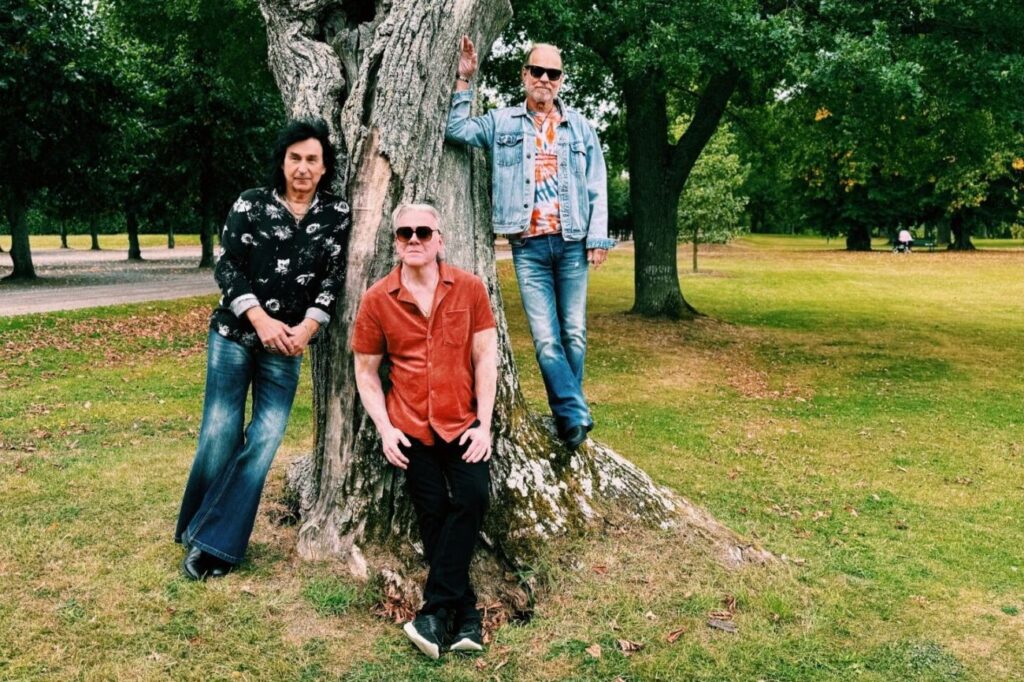
Du nämnde ju Only One Woman nyss, och en gång i tiden, för 37 år sedan ungefär, så fick ju den låten er att lysa ganska starkt som band där under en tid. Hur känner du för den låten, nu 37 år senare, som ändå var så pass populär?
Alltså, det blir faktiskt som en kär vän. Även kära vänner kan man ju liksom känna att man inte får träffa för ofta. Men det är en kär vän och den låten gjorde ju jobbet åt oss, kan man säga. Alltså, den talade ju om vilka vi var för otroligt många över hela världen, så därför måste man ju vara väldigt glad för den. Så är det.
Ni var ju inte så jätteunga, men tycker ni att ni kunde ha tagit vara på er tidiga framgång på ett bättre sätt, eller gjorde ni ändå allt ni kunde göra då?
Alltså, det finns en förklaring som gör att det blir som det blir. Alltså, jag kan tycka att jag var inte helt bra bandledare heller. Så jag kan ta på mig en del av skulden. Vi spelade in på Polar-studion här i Stockholm med de bästa förutsättningarna. Det var Mark Dearnley, som hade varit med och jobbat med AC/DC bland annat, som vi hade som producent, och Bernard Löhr som tekniker. Han jobbade med ABBA också. Så det var jättebra. I alla fall så släpptes det en singel, Only One Woman, och en baksida (Somewhere Out There) som Jim och jag satt ihop, för vi ville inte slösa upp någon av de här låtarna vi hade gjort. Så vi skrev en låt som vi spelade in i Göteborg, och den var instrumental för att vi tänkte ”Det är väl bra att lägga på baksidan.”. Och då testade man Only One Woman på Tracks och den gick inte in, så den var borta. Däremot vände man på den och hittade baksidan. Den gick in på Instrumentaltoppen. Det var någonting som fanns då. Och då var det Brusa Högre Lilla Å med Janne Schaffer och det var Surfing With The Alien med Joe Satriani, och vi slog ut dem. Så vi tog oss in på första plats och det var ju liksom jävligt märkligt för då helt plötsligt trodde man att vi var ett instrumentalband. Så det var ju jättekonstigt när vi hade Jim på sång. Men så blev det inte mer än det, utan då sa skivbolaget ”Nej, nu får ni åka över och spela in plattan här.”, för vi hade gjort demos och sådana här grejer. Så vi åkte över i februari ’88 till Los Angeles och så var vi där, Tobbe och jag, fram till maj nästan. Och under den tiden vi var där så breakade vi. Då hade de vänt på plattan igen och spelat Only One Woman en gång till och då hade den gått in på Trackslistan och lite andra listor. Vi fick inte ringa hem för att det var så jävla dyrt att ringa från Los Angeles. Vi hade inga mobiler då på den tiden. Så att de skickade fax, ”Hej, nu har ni gått in på Trackslistan.” – ”Ja, fan vad kul.” och så sitter vi där med Hawaiiskjortor och är liksom långt bort från verkligheten. Och ”Ja, nu är ni inne på 18:e plats.” – ”Va? Har vi inte åkt ut än?”. Det var ju skitkul. Sedan på 15:e plats, och så höll det på så, och sedan när vi kom hem så hade vi legat etta någon vecka eller två. Vi hade inte fattat det liksom, att vi hade breakat så det stänkte om det. Vi kunde inte ens låtarna liksom. Så det var bara att börja repa på dem och sedan hade vi 70 jobb bokade i Sverige bara. Och då var vi alltså ute, och även över till England, för vårt skivbolag var ju egentligen engelskt. Vi hade vår worldwide deal. Så vi gjorde fotosessioner i England. Du vet, man är där en vecka och så kommer man hem och så har man mer jobb. Så vi åkte som galningar. Och jag var ju så där galet liksom bara ”Framåt, framåt, framåt, framåt.”. Men samtidigt mådde jag inte så jävla bra heller liksom, för jag var överansträngd och överallt som man är. Men Jim då, sångaren, han tröttnade bara på det. Han orkade inte med det. Så han slutade då. Och där borde jag ha bromsat. Där borde jag ha sagt så här ”Nämen, nu lägger vi ner och så tar vi det lugnt i ett halvår så att alla får vila upp sig och så kör vi sedan.”. Men man gav vika för olika typer av påtryckningar och allt jävla smicker. Det biter ju på människor. Och så tog vi med en annan sångare (Pete Sandberg) som vi körde med då nästa år. Och det gick ju jättebra. Han och jag var över i Los Angeles någon gång och vi spelade in sång och sådant där på låtar. Vi var över och gjorde videor och så där. Så allting gick ju på där. Men utan Jim blir ju bandet inte lika starkt, va? Så det märktes ju då och året efter så slutade de andra, så var det bara den nya sångaren och jag kvar och vi gjorde en platta som hette Shiftin’ Gear och vi åkte på en tio jobb med EMA Telstar och sedan så la vi ner. Det man gjorde var att man följde tidens intensitet, för alla musikstilar har ju ett visst bäst före-datum. Så vid ’90–’92 någonstans, så hade ju vår genre börjat gå ner i popularitet för det kom ju Red Hot Chili Peppers och Nirvana. De tog liksom över och det blev en annan stil på musiken. Så jag tror inte att vi hade kunnat förlänga musikstilens popularitet mer, men däremot så hade Jim kunnat vara med ett par år till om vi hade gjort rätt. Han hade kunnat göra både solokarriär och spelat med oss. Men på det sättet som det blev där så blev det ju att vi förhastade oss, tycker jag. Vi skulle ha tagit det lite lugnt. Så där som Queen gjorde. Freddie Mercury ville göra något och då stoppade de. Så väntade de in det och så gjorde de det igen. Så borde vi tänkt, men gjort är gjort.
Många artister får frågor om vad de borde ha gjort och vad de skulle ha ändrat på, men jag ska ställa frågan precis tvärtom. Vad gjorde du perfekt rätt då?
Alltså, rätt var väl att jag körde på trots allt och såg att allting var möjligt, och på det sättet så fick jag ju vara med om en massa roliga saker. Jag har ju varit med om otroligt mycket. Jag kan ju berätta lite roliga grejer som hände. Att jag flyttade upp till Stockholm var ju för att min fru är Stockholmskvinna. Hon är ju härifrån. Hon fick jobb i Stockholm och flyttade tillbaka. Hon var ju restaurangchef och hovmästare på Baldakinen, på de här nattklubbarna. Så hon fick ju tillbaka sitt jobb när hon flyttade upp, så att på det sättet så passade det väl henne bra. Men när jag kom hit till Stockholm, då hade ju tidningarna slutat ringa. Helt plötsligt så blir det bara tyst i luren. Jag hade ju alltså minst ett samtal varje dag från journalister eller radio som ville prata med mig. Så det var hysteriskt. Helt plötsligt är det bara tyst, och det är jävligt läskigt när det är det och man känner sig jävligt ensam, och ingen vill ta i en med tång nästan, kändes det som. Så jag åkte in till Fryshuset. Det var ju när det låg vid Danvikstull. Så frågade jag några stycken, som visste vem jag var, om jag kunde få en replokal, och det skulle de fixa. Så de fixade så att jag fick en replokal där. Så jag försökte skrapa ihop lite människor som jag kunde börja lira med igen, bara för att jag tänkte ”Jag måste ju få igång någonting igen.”. För jag hade ju inget band. Jag hade ju låtar ändå som jag hade skrivit. Så vi repade där. Jag fick ihop lite människor. Så repade vi ett halvår där eller någonting. Och då hade jag inte betalat någon hyra, utan det var ju liksom hyresfritt. Då tänkte jag ”Fan vad snälla de är här i Stockholm.”. Det var ju han Anders Carlberg. Han var ju en av sossarna. Han satt ju med där. Han var ju tung liksom. Så han skickade någon av de närmaste därifrån, ”Tony. Du har ju inte betalt hyra nu på ett tag. Men du ska få jobba lite åt oss så ordnar det sig.” – ”Jaha. Vad ska vi göra?” – ”Vi ska åka över till Sovjetunionen och spela och representera Sverige.” – ”Shit. Hur fan ska vi göra det här?” – ”Jamen, det är det att kulturutbytet är så jävla viktigt för relationer och så där.”. Så jag åkte över till Sovjetunionen. Och det var ju en jävla magisk resa alltså. Vi blev rånade. Det var ju från EMA Telstar och det var folk från pressen och det var från Frysen. Det var ett stort gäng som åkte. Och vi blev ju lurade som fan liksom på olika grejer. Vi spelade in en propagandavideo för Sovjetunionen, med hammare och skära och sådant där. Du vet, vi trodde ju att det var en rockvideo. Och de var ju jätteduktiga. Men det var ju rena propagandan för Sovjetunionen som vi är med i. Så det var jävligt intressant hur det blev. Men det fanns ju inget käk i staden. Vi tänkte ”Hur fan ska vi göra det här?” och helt plötsligt fick vi reda på att det fanns ett McDonald’s, ”Va? I Sovjetunionen?”. – ”Javisst, det finns här.”. Det var ett McDonald’s som var tio gånger så stort som de här. Så alla ville äta amerikanska hamburgare. Vi hade inte fattat någonting. Så vi tog oss till slut därifrån i alla fall. Och det var ju en grej som jag då fick vara med om. Och sedan när jag kom hem därifrån så frågade jag om jag skulle kunna få göra någon platta med Alien, för jag hade skrivit låtar, men då fick jag göra en soloplatta istället, på samma skivbolag som Dana Dragomir och Åsa Jinder hade jobbat med, så det var ju häftigt. Så jag gjorde en soloplatta där. Det var ju Rutger Gunnarsson och jag som proddade plattan och det var kul att jobba med honom. Så det fick jag göra och det tyckte jag var jävligt bra med, för att egentligen var de låtarna gjorda för att det skulle vara sång på dem. Så jag fick snabbt fixa upp det så jag spelade melodin på gitarren. Men det blev ju bra ju. Så jag kände ”Fan vad gött att man inte behöver ha sångare för en gångs skull.”. Så det tyckte jag var rätt bra gjort. Sedan gjorde jag några plattor som var ganska missförstådda av mig. De är inga som jag är så här stolta över idag.
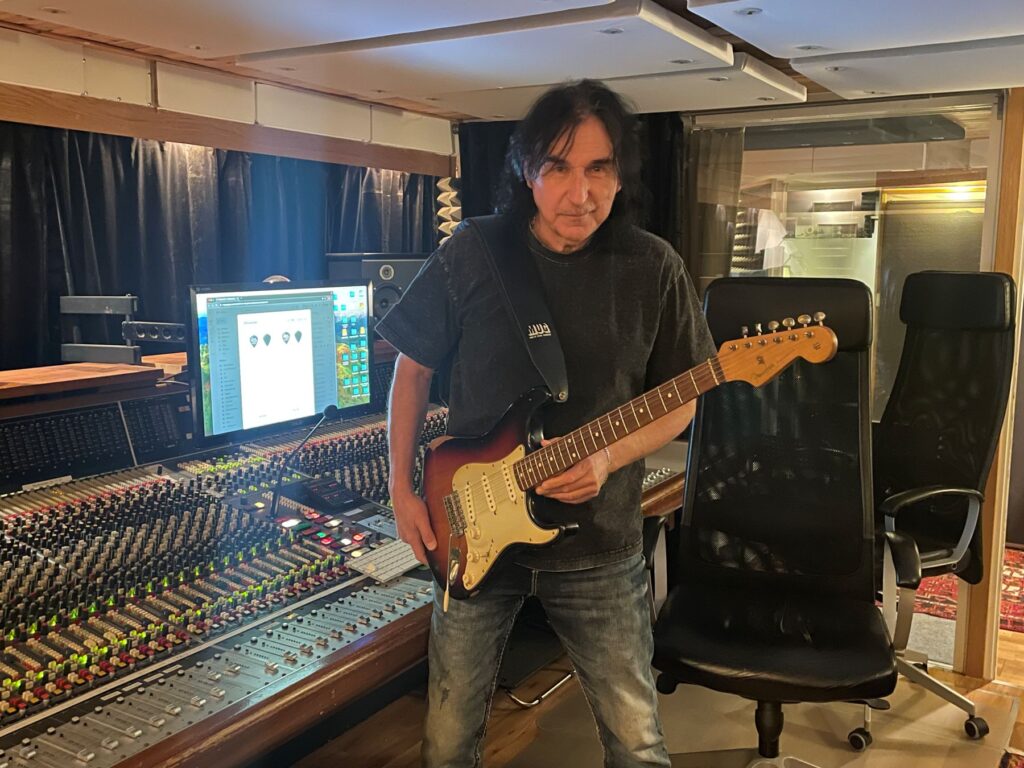
Du har ändå varit rätt kreativ med Alien, även fast det har varit med olika sättningar, och med soloplatta också. Men känner du att du har fått ut all kreativitet du har kunnat få med Alien? Eller skulle du vilja ha släppt fler skivor?
Ja, med mig själv. Det du säger nu är precis det som jag jobbar på nu. Jag ska göra fler grejer nu. Jag har många kryss som inte är färdiga, som jag ska signera eller bocka av. Jag har redan spelat in faktiskt delar av en bluesgrej som jag har gjort och som ska släppas. Bland annat så har jag haft med Robert Wells på piano. Så jag har redan jobbat lite med det faktiskt. Det finns färdiginspelat. Jag ska bara lägga lite gitarrer och så ska det mixas sedan. Och jag vill göra en instrumentalplatta till. Jag har hållit på att jobba lite på hur. Jag har inte tänkt ut riktigt hur jag ska göra det. Men det vill jag göra, för jag gillar instrumentalmusik. Ibland är det mysigt att inte ha text, utan man ska försöka få ut allting i melodin. Så lite sådant där har jag hållit på med och filar på. Och jag har spelat med lite andra människor också, så jag har inte bara Alien, utan jag har lite andra grejer som jag gör liksom.
Alien har ju tillbaka lite av originalsättningen. Även fast ni inte har spelat tillsammans hela tiden så har du varit limmet i bandet under alla de här åren. Men hur hittar man tillbaka till varandra? Hur gör man det som artist och människa?
Basisten (Ken Sandin) och keyboardisten (Jimmy Wandroph) slutade ju inför 2020-plattan, för de ville inte ta ett sådant steg av någon anledning. Jag ville göra den plattan som vi gjorde. Så de ville inte vara med. Det var ju tråkigt tyckte vi då, så dem hittar man ju inte tillbaka till, för de sa ju tydligt att de inte ville vara med. Tobbe var ju den som var med mig absolut först. Redan för 40 år sedan när vi var över i England och sökte dealar. Och Jim har jag känt sedan dess också. De två har jag haft kontakt med hela tiden. Det gäller bara att få alla att på något sätt ställa in sig på ”Att nu gör vi det här.”. Det är väl mer då att man ska liksom vara överens om att man har tiden och att man har lusten och så. Men so far, so good. Vi skulle ju egentligen åkt ut och spelat 2020. Vi hade ju en del festivaler och konserter som vi skulle göra, men allting stektes ju, så vi fick ju ställa in. Och när vi väl skulle åka på en grej så hade Tobbe brutit handen, så han kunde ju inte spela trummor liksom. Så det var lite dålig tajming på allting. Men nu är det ju dags att åka ut, och då gör man ju det, och då förenar ju det också en del. Det är mysigt att vara ute och lira och så där.
Ofta får sångaren i bandet kanske oförtjänt mycket av roset kring ett band, och kan man känna det som huvudsaklig låtskrivare och efter att man alltid egentligen har varit med i bandet, eller haft bandet som sitt lilla gosedjur eller någonting, att ”Va fan. Det här är ju min grej också?”. Hur känner man? Berätta hur tankarna går.
Ja, det är skitjobbigt. (Skrattar) Men jag kan säga så här: jag har också varit så förståndig, och det kan jag tycka att jag är stolt över. Jag har alltid frågat Jim ”Är det här rätt tonart för dig?”. Jag har alltid förstått att det ska passa honom. För jag vet ju också vikten av att ha en riktigt jäkla bra sångare i ett band. Det behöver inte betyda att man tycker att alla ska liksom bara titta på sångaren. Nu har vi hållit på så länge, Jim och jag, så jag har vant mig vid att han får mycket ros för det han gör. Sedan när man väl har tröttnat på att snacka med Jim, då kommer man ofta till mig. Då är gitarristen näst bäst. Det får man gå med på då. Men ibland är det jobbigt. (Skrattar)
När ni träffas nu, pratar ni mycket sent 80-tal då, eller pratar ni även mycket dagens musik?
Vi pratar dagens musik och vi pratar utifrån lite grann vilken roll vi har idag som band. Alltså, vi tycker ju att vi fortfarande är de där nya från Göteborg, men det är vi ju inte riktigt längre, utan nu börjar vi bli liksom lite ett kultband istället. För att först blir man ju jätteintressant och sedan blir man ju ute, kan man säga. Det är ju jävligt svårt, och de här plattorna jag gjorde med Daniel (Zangger Borch), då var man lite i uteläge, om man säger så. Men det vi pratar om nu då är ju att ”Var funkar det för oss att vara med? Vilken roll kan vi ha då?”. Jo, vi kan ha en roll att vi liksom har en stil som inte många kör idag. Och man får tänka på att Eclipse och H.E.A.T och de banden, de hade ju inte funnits utan oss. De har kopierat vår grej, fast de gör det inte som vi gör det, utan de gör det på sitt sätt. Men vi har ju varit inspiration för de banden. Det vet vi ju, eftersom jag känner ju de från H.E.A.T. De lyssnade fan ihjäl sig på våra plattor. Så att man vet att de liksom gjort det här. Då tänker vi så här, att ”Kan vi liksom istället vara ett kultband?”. Om vi är ett band som man vill se liksom för att vi står för en trovärdighet och något sådant där, så är vi ju skitglada för det. Det spelar ingen roll för oss. Bara vi inte är ute, utan bara vi är inne i värmen igen. Och det känns väl som att vi är inne i det nu. Många har hört av sig och vill boka oss.
Men det måste ju vara väldigt, väldigt svårt att få nya, yngre fans numera, med tanke på vad många ungdomar lyssnar på. Alla ungdomar lyssnar inte på rockmusik som det typ var för 40 år sedan. Men det kanske inte är intressant för er så länge ni har en skara att spela för.
Man får ju tänka så. Man får ju vara glad för de man har, så att säga. Men sedan är det ju så också att det är ju liksom upp till oss också. Vi måste synas. Vi måste liksom vara ute och lira. Exempelvis på en festival. Vi spelade på Sabaton Open Air och det är ju en ren metalfestival. Men då var det otroligt många som kom till vår scen. Så vi blev liksom ett andningshål också. Man får inte glömma heller att alla de här metalbanden har väldigt snarlikt sound. Alltså, det låter likadant från band till band på en festival och kan vi komma upp och göra en lite annan grej så kan det ju vara som ett andningshål på en festival och då på det sättet kan folk tycka ”Fasen vad coolt.”. Och då får vi nya människor, för att människor är ju liksom mottagliga för nya intryck också. Det är ju inte så att det är stängt bara för att de råkar vara i 20- eller 30-årsåldern.
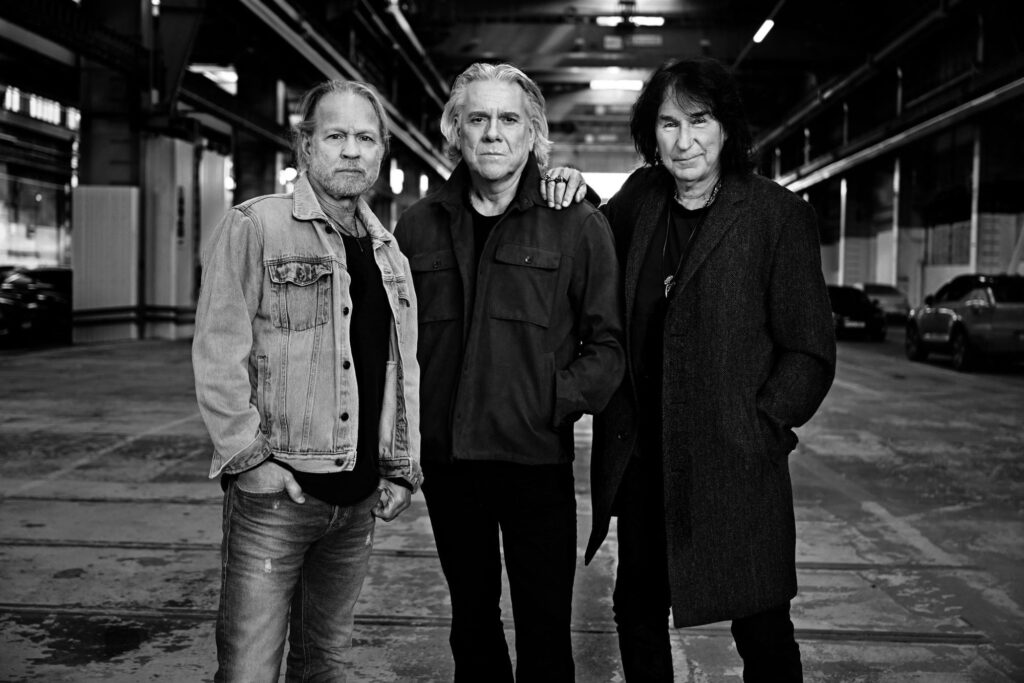
Micke: Om någon frågar dig vad Alien spelar för musik, vad säger du då? Säger du hårdrock? Säger du melodiös hårdrock? Säger du AOR?
Jag säger nog inte melodiös och inte AOR. Jag säger att vi spelar hårdrock; classic hårdrock. Och en grej som jag tycker är otroligt viktig för oss då: att vi är ju européer, så vi kan ju aldrig låta amerikanska. Alltså, jag är ju uppväxt med europeiska musiker. Det är med Clapton och med Ritchie Blackmore och Led Zeppelin och allt vad det är, och det är vi ju i Sverige för det har ju legat nära oss. Men däremot så var vi ju ganska inspirerade också av det amerikanska. Det var lite mer finess över det om man lyssnar på Journey och de där. Det var liksom väl producerat, om man säger så. Så det tog vi till oss. Och det var nog också en del av det som gjorde att vi slog igenom, tror jag. Européer som har en sådan tradition i blodet som vi har, som ändå sneglar liksom på USA, den kombinationen är ju bra, och det är ju vi. Alltså, det är ju fortfarande så att vi vill liksom ha lite amerikanskt sound, men så är vi ändå européer som spelar europeiskt. Och det är ju som Deep Purple, eller vad du vill. Eller Yngwie Malmsteen. Alltså, han är ju ändå väldigt teknisk, men det finns ju ändå någonting. Man hör att det inte är amerikanskt, om man jämför med Satriani och Steve Vai och de här musikerna. Jag vill bara poängtera det. Och det gäller att förstå också sin egen identitet. Mycket av den metalen som spelas idag är ju tysk. Det är tysk marschmusik liksom. Och det är ju inte för att förringa den på något sätt, men det är bara hur man uppfattar den. Vet ni vad sekvens är för någonting? Det är liksom när allting är periodiskt. Stelt liksom. Nu svävar jag ut här, men det är ju väldigt långt bort från den afroamerikanska traditionen. Alltså, man tänker sig folkmusik och blues och det där, där det liksom fick vara lite svajigt och så. Och lyssnar man på exempelvis jazz, hur den spelades i Tyskland på 30- och 40-talet, så var den väldigt mycket stel. Det var ganska stelt gjort, medan den kunde leva väldigt mycket i USA. Det var lite mer fritt liksom. Man hör jättestor skillnad. Jag vågar påstå, det är inte vetenskapligt, men det är min egen spaning i alla fall, att mycket av den musiken på just metal-sidan har väldigt stor avsaknad av afroamerikansk tradition. Och det har ju inte vi då, utan vi har ju med oss den grejen i vår musik.
Mycket av den musiken som ungdomarna lyssnar på idag, typ modern musik, jag tycker att den kan vara ganska död. Mycket av det liksom. Jag vet inte, men ibland finns det inget liv i den. Klart, mycket musik är ju så datoriserad nu för tiden, så det är väl inte så konstigt.
Och det är nog det som det blir när man gör det övermycket. Jag vet ju också hur man jobbar med inspelningsteknik. Man jobbar ju väldigt annorlunda numera med hur man sätter toner och så där. Man editerar ihjäl sig så att allt ska vara mitt i prick. På den här plattan som vi har gjort nu har vi ju undvikit det. Nu har vi använt klick eftersom vi jobbar på tre olika studior, men på första plattan vi gjorde, där satt man med tidtagarur och så tog man tiden på fyra takter, ”Hur lång tid tog det?”, och så tog man fyra nya takter, ”Ah, det var ganska lika.”. (Skrattar) Så det var ett annat sätt att jobba på liksom.
Jag tycker också att det kan vara härligt med sången i lite äldre musik ibland, att alla refrängerna inte var exakt likadana och att det blev lite förändring. Man hade inte klippt ut första refrängen och klippt in den två gånger till, så texten kunde vara lite annorlunda i dem.
Men det är så underbart. Och just det du säger också, att mycket av det som man har gjort på tidigare inspelningar har ju varit missar. Det finns en miss som kanske inte borde vara där, men den är ju där, för man var så nöjd med allt annat som hände just precis i den tagningen. Så har vi ju tänkt lite när vi har spelat in nu. Man har inte försökt putsa ihjäl sig. Det finns till och med ett ställe där man hör lite tyst att kören sjunger något innan de ska sjunga. Jag vet inte riktigt vad det är. Men någon hade hört det. Då får man lyssna jävligt noga på plattan. Det är charmigt när det är så. Det får inte vara för mycket sådant, men det är i den andan man vill jobba i, att inte allt är sönderproducerat. Så har vi tänkt nu. Men vi har ju haft väldigt bra hjälp av en kille från Nox-studion som heter Nicklas Bergström. Han har varit med och producerat plattan med oss. Så det gäller ju att man ibland har någon utomstående också. Exempelvis på trumsidan så har han varit väldigt på. Alltså, vi hyrde in de bästa trummorna som finns i stan och så tog vi dit en grym kille som ställde upp trummorna och gjorde så att det skulle vara perfekt trumljud. Alltså, man började med toppkvalitet. Och då är det akustiska grejer. Om man tänker sig på de här metal-plattorna som jag pratade om, där kanske de skiter i akustiskt, bara för att det ändå ska vara liksom bara triggat och allting, med samplade ljud och så. Men vi tyckte att det var viktigt att ha ett bra grundljud som är akustiskt liksom för att kunna jobba från det. Och där har Nicklas Bergström varit jävligt tongivande, för han har också gillat det. Så han har liksom mickat jävligt noggrant. Det tog en hel dag innan vi var klara med ljudet. Så det är inte så jävla ekonomiskt, som ni förstår. Det är mycket tid liksom. Det kostar ju också en del, men det tycker jag fan är värt det alltså.
Kunde du någon gång för länge sedan känna att din dröm inom musiken hade uppfyllts?
Ja, det var en otroligt bra fråga, för under de här dåliga åren när skolan inte funkade, då stod jag på ett berg och tittade ut och så tänkte jag så här ”Tänk om jag kunde få vara på en festival.”. Och det var liksom min dröm. Jag stod bara och blundade och drömde ”Tänk om det kunde få bli så någon gång.”. Och jag har ju gjort alla de där. Jag har ju spelat på Sweden Rock och på Gröna Lund och på Liseberg, och på Liseberg hade vi publikrekord när vi var där. Så jag har gjort allt det där, så frågan bara är ”Vad är drömmen?”. Alltså, min dröm var egentligen så här: det var ju att stå och spela på festivaler, men den innersta drömmen var egentligen inte det, utan det är ju att få behärska en kunskap. Jag var beredd att alltså gå i fängelse bara för att få mer tid att öva, ”Jag kan leva i något slags kloster eller vad som helst bara jag får öva mer än tio timmar om dagen.”, för jag visste vad jag ville uppnå musikaliskt. Det stora var från början för mig att bara få bli duktig och jag kunde tänka ”Jag kan sitta och spela själv bara jag får vara duktig på någonting och kunna någonting.”. Men sedan efter det då så får man ju ett annat perspektiv. Jag satt och kompade Lill-Babs. Jag hade haft väldigt många bra år som studiomusiker och sessionsmusiker. Jag kompade en massa artister. Alla du kan tänka dig som fanns under 80-talet kompade jag på olika ställen. Och det slutade med att Robert Wells ringde mig och sa ”Hej. Lill-Babs ska ju göra sin krogshow. Kan du tänka dig att sitta och kompa den?” – ”Ja för fan. Jag gör det.”. Och då var det ’86 då och jag satt en hel höst med henne. Och då tog jag över Lasse Wellanders noter som han hade haft här i Stockholm, och då upptäckte jag att det var inte alls det jag ville bli. Det var ju absolut inte det jag ville bli. Så det hjälpte ju till då, med att jag försökte starta upp någonting, men då kände jag verkligen tydligt att ”Nä, studiomusiker vill jag inte bli, utan jag vill ha mitt rockband om det ska funka.”. Och då hade jag redan börjat ’85 med det, så precis 40 år sedan. Och då när jag fick pengar från Lill-Babs-showen så hivade jag in det till en studio, ”Nu kör vi.”. Och då hade jag skrivit låtar också med en av dansarna där, som hade skrivit texter. Max Stone heter han. Så han hade liksom hjälpt mig att få ihop lite texter då, så vi kunde ha någonting att börja med. Så att så började det, och från där då så var ju visionen ”Nu vill jag komma ut och vara rockmusiker.” och på det sättet så fick jag ju den drömmen besvarad. Men jag är inte nöjd, utan det finns lite till att göra. (Skrattar)
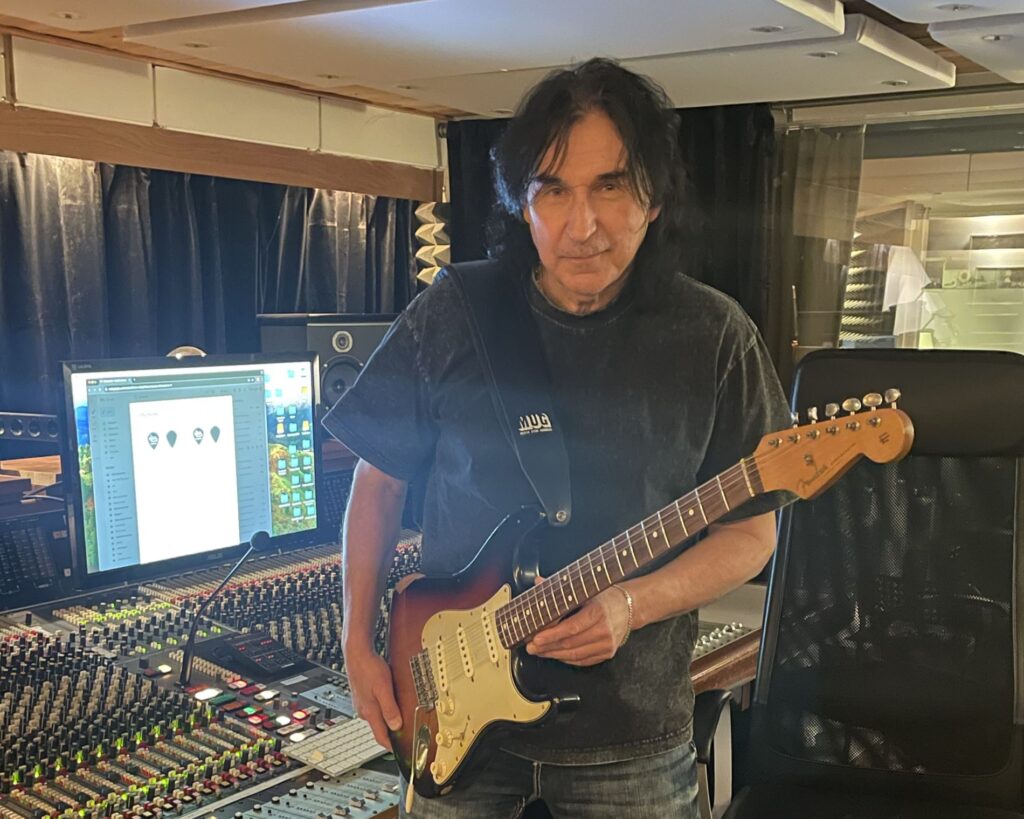
Det är ju det som är grejen. När man väl har hittat det man sökte efter och passerat den toppen, då söker man ju nya vägar och då vill man söka något nytt man kanske drömmer efter.
Det finns en gyllene regel här. Man kan ta bort artister som är stormrika som Tom Jones eller Beyoncé eller någon sådan där artist, för det här gäller inte dem. Men normalt sett när du är musiker så är det så att det som är det optimala är att man spelar precis när man själv vill. Det är det optimala. Men så fort du är i ett samarbete med arrangörer, producenter, skivbolag och vad det nu är, då talar ju de ibland om när du ska spela och det finns en viss frihetsgrej som försvinner när du spelar mycket, och det var det som hände då den sommaren när vi var ute med Alien. Vi sov ju knappt, vi bara spelade liksom, och då blir det inte lika roligt heller. Så det gäller att ha den där avvägningen att man ska vara klok och så ska man anpassa det så att man alltid tycker att man är utvilad. Det är sådana här kloka grejer som man kommer på med åren. Det är inte sådant man kanske gör när man är väldigt ung. Men det är sådana tankar man har, och det är svårt att tala om för någon annan, utan de flesta upptäcker det här själva. Men energi finns det fortfarande, kan jag säga. (Skrattar)
Jo, det är uppenbart, annars skulle du inte fortsätta att göra skivor.
Micke: Jag bara tänkte på när du berättade att de inte ringde till dig längre och när det var tyst. Var det inget annat band som var och ryckte i dig då? Det borde det ju ha varit. Alltså något annat band som ville ha dig som gitarrist.
Ja, men då hade ju de flesta av de banden gått ner. Alltså, Europe och Treat la av precis då. Så det var ganska dåligt allmänt. Så det som gjorde att jag kunde hålla igång där var ju att vi hade så jävla bra rykte så jag kunde vara ute och spela på lite mindre ställen. Men det var ju verkligen kasst. Men sedan spelade jag ju, som sagt, med olika människor under hela 90-talet. Alltså Europe-människor och andra människor. Det var ju skitkul det där. Jag var till och med med i Wasa Express och spelade. Jag hoppade med på en platta (Psychedelic Jazz Trance) där. Så jag var ute och snedseglade rätt friskt där under några år. (Skrattar)
Är det hur lätt som helst för dig att bara anpassa ditt gitarrspel efter ny musik?
Jo, men jag kan det. Man har ju en viss ton, men har man en viss musikalitet och viljan, så. Jag vann ju exempelvis SM i Country i början på 80-talet och då spelade jag lite mer Dire Straits-stil så där, och det är ju egentligen bara att ta bort disten så får man ju liksom det på något sätt. Så det är ju inte så jättesvårt. Men det hade jag ingenting emot att göra, för helt plötsligt limmade det in i den musikstilen skitbra. Ja, det kan jag tänka mig att göra fler gånger.
Ja, du får skynda på om du ska hinna med allting.
Micke: Övar du mycket fortfarande? Alltså, om du bortser från att du ska gigga, sitter du hemma och bara övar?
Ja, det gör jag. Alltså, varje dag är det ju minst en timme framför TV:n. Jag sitter bara och tittar på tråkiga program, men lyssnar bara, och jobbar teknik.
Men då kan jag ju förstå att du fortfarande kan spela liksom. För många slarvar ju vartefter åren går.
Jag vet att väldigt många sitter hemma mycket och dricker vin och så, och tycker andra grejer är roligare, som att spela golf och dricka vin. Jag är inte nykterist, men jag försöker hålla mig borta från det. Jag kan ta några whisky någon gång. Men jag vill inte göra mer än det. Jag kan inte sitta ner och titta på när gräset växer. Det stämmer inte på mig. Jag kan säga så här: när de gör reklam för Vingresor och sådant där, och så visar de Spanien och så visar de en solstol och så ligger någon där, alltså, jag känner ju att jag får ångest efter en halvtimme. När vi har åkt utomlands så har jag haft jävligt svårt för att bara ligga. Jag vill gärna gå och titta på intressanta kyrkor, eller vad som helst, bara för att jag har svårt att bara ligga bort tiden. Jag kan inte förklara vad det är. Det är en inre motor här. När jag blir äldre så får jag väl tänka att jag får ligga ner, men just nu så vill jag få saker gjorda mer.
Av Tobbe – Publicerad 17:e mars 2025
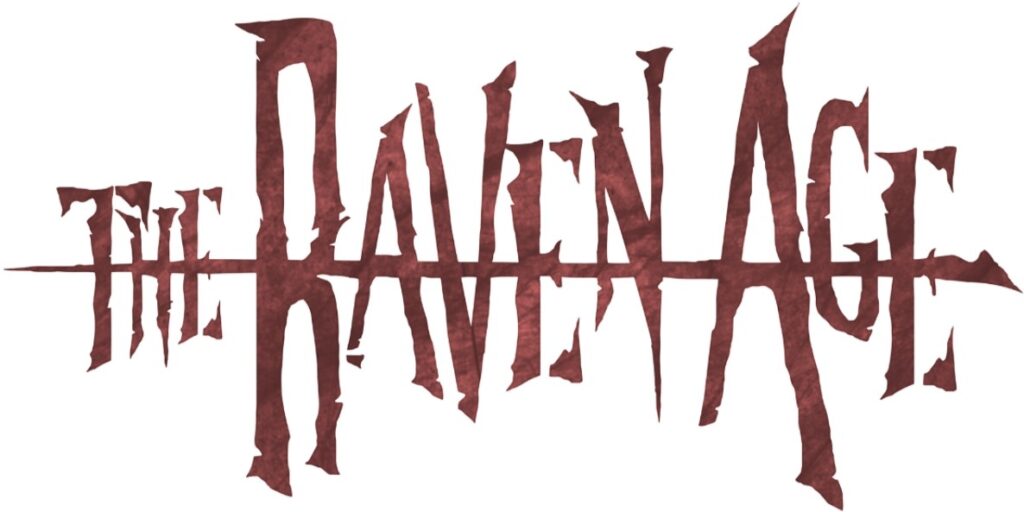
The Raven Age is currently out on a European tour, and as the band visited Stockholm on March 9th, Metal Covenant was given some time to talk with MJ, the band’s lead vocalist.
This is, I think, the fifth time you’re out kind of supporting the Blood Omen record in one way or another. I remember you were out with Maiden when the album was brand new, or even before that, and then you’ve been with Apocalyptica, and on a couple of headline tours, and with Lord Of The Lost as well. So, has touring several times on an album become the norm and something inevitable for the band?
Yeah, I mean, we’ve always attempted to be as proactive on the road as possible. What we’ve always tried to do as a band, and I think we’ve done fairly successfully, is that we can pretty much tour most territories. We may not always be playing, like, the biggest venues and that kind of thing, but, you know, we can have listeners in most places. So we try to kind of expand as much as possible, even if it is, you know, in the smaller markets, whereas, I don’t know, maybe some other bands of our kind of size would just stick to one area. Like, one area where they’re from, and maybe expand a little bit more. But we try to get out to as many different places as we can. And the other thing that we have to remember is, when Blood Omen first came out, we chose to do, obviously, the support slot with Lord Of The Lost, which was amazing, and then with Apocalyptica, our view was we’ll be playing to maybe different styles of audiences, and audiences that haven’t heard the stuff before, to expand. And, you know, just on the first three shows now, we did Tilburg, Hamburg, and Copenhagen, we’ve met quite a few fans that have said, “Yeah, we actually saw you for the first time on the Apocalyptica show.”, or, “We actually saw you for the first time on the Lord Of The Lost show.”. So it’s good to kind of play these songs for them, I still think, for the first time, and obviously the back catalogue as well.
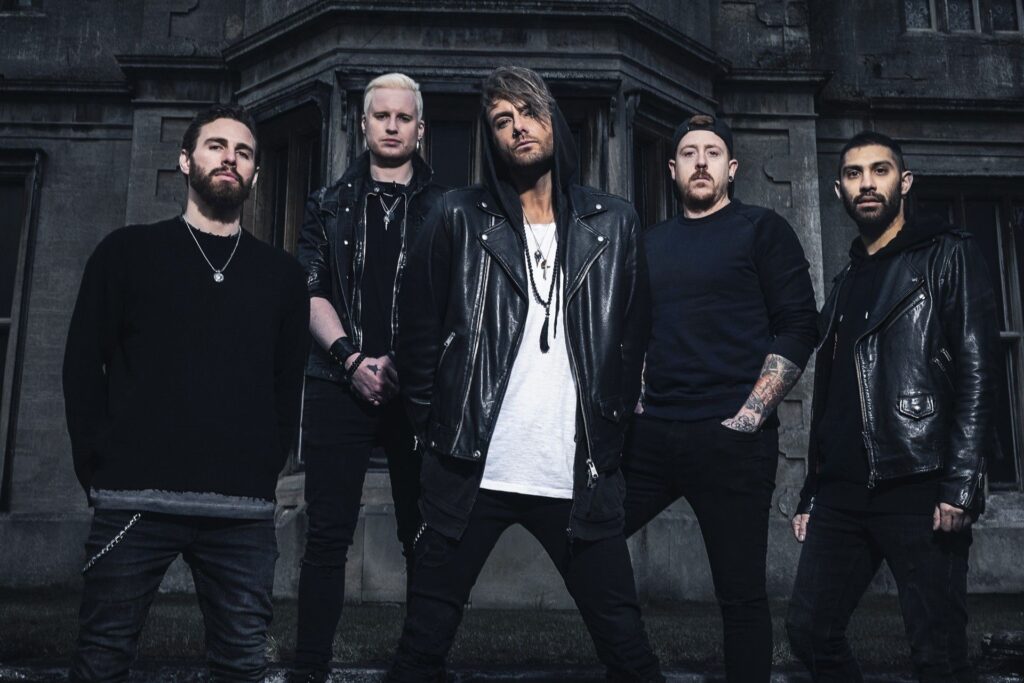
And have you been looking to go on tour outside Europe as well?
Yes, absolutely. You know, we’ve been planning, or been trying to get back over to North America and South America for a while now. We’re actually trying to do it this year. It’s just it’s become a little bit of a financial complication. Not just for us, but for a lot of bands that aren’t, you know, big. So we are looking into ways, logistically, that we can get over there, and make it work for us financially, you know. That’s the main thing. It’s an ongoing pursuit.
South America, and also the western part of the United States, mean long distances between the cities. You can probably not play, like, every day. Well, if you fly in South America, but that’s expensive.
To be honest, I actually think that’s the only way you can do it. It’s lots of space in between. When we did a tour there in 2019, I believe, when we got to South America, we had to leave the bus behind, and we had to purely take flights, because it’s just not safe to do it any other way. You’ve just got to do it this way. So we do have a rig that’s capable of doing that, in terms of our setup, because we’ve already done it. So we were in America in 2019, and we went back over there for our own shows, our first headline shows in California, New York, Chicago, places like that, like the biggest cities, and because that was when Covid happened, we had to stop and come home. And it was dreadful, because we feel like we never got to do that, and people, obviously, our fans over there, are still waiting for those shows as well. So it’s a difficult one.
Blood Omen was out in early July of 2023. Maybe on the seventh, if I remember correctly.
You probably remember better than me. I struggle to know what day of the week it is at the moment. (Laughs) (Which in fact becomes evident as MJ on stage later in the evening says Saturday when it’s actually Sunday.)
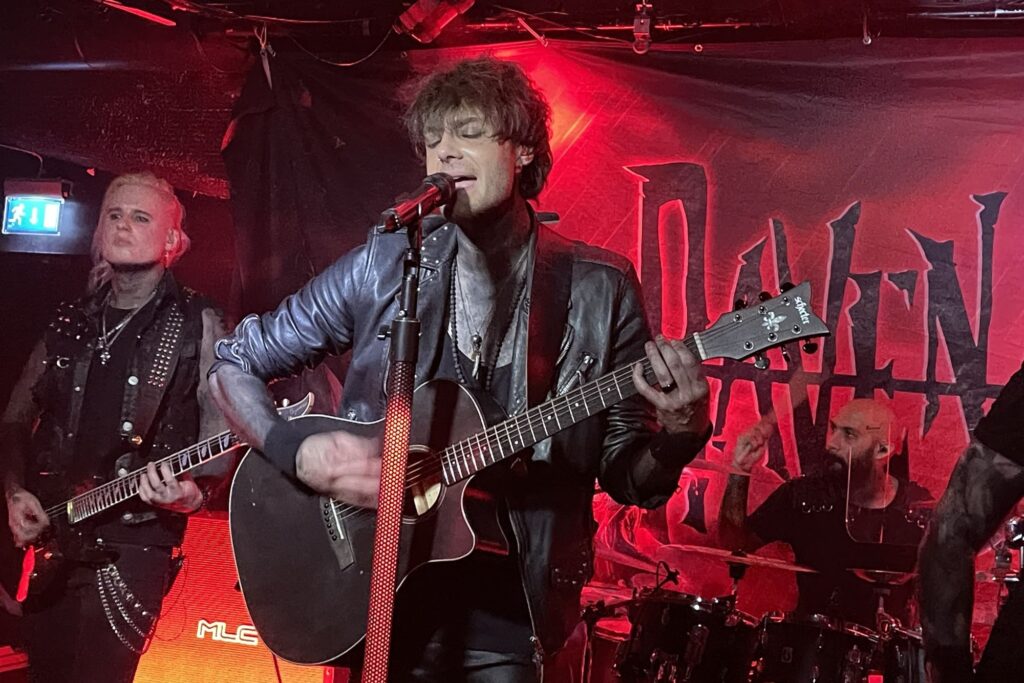
But if you listen to that record today, do you look at it differently now than what you did about two years ago when you left it to the record company?
Yeah, it’s difficult. You know, we are very, very proud of the album. It’s been a really solid album for us. The thing that I’ve learned about being in The Raven Age is you’ve always got to be prepared for negative press somewhere, and very fortunately, I couldn’t find any negative feedback on the album, which was really nice from, like, a reviewer’s perspective, and that was a really nice thing. There are songs on there that maybe had I done it around differently, it would have potentially changed single choices. That’s one of the only few things I would have changed going back. Like there’s a track, it’s one of my favorite tracks on the album, and it’s become a real popular fan favorite as well, it’s a song called The Journey. I always feel that that should have been a single, especially for the American market, had we, you know, been able to do that over there. But I think largely we’re very happy with the album, and the reception of the album was the thing that was most impressive. It was the proper follow-up to Conspiracy, and Conspiracy has kind of been, you know, the biggest album we’ve done at the moment, so we wanted to make sure that we, you know, celebrated that well. But now I’m already thinking about the next stuff, you know. It’s how my brain works.
And in late November last year, you put out a new single, Guillotine. Tell me about that song.
It was meant to be for a video game that we were doing, you know. I don’t even know if I’m supposed to say this, but I don’t care. (Laughs) It was meant to be for a video game that we were doing with Sony. It was for a video game that they were doing for the PlayStation Exclusives. And we’d done everything that we could. You know, we’d signed contracts, they’d commissioned it. You know, they paid for us to record it. And then it just didn’t happen, last minute. They went in a different direction, which I found very odd, because they’d already paid for it. So we were like, “But these guys have got so much money, so it’s like a drop in the water to them.”. So it never ended up happening, but we had the single, and obviously we had this tour. And it’s interesting, ‘cause the Forsaken Tour is not really promoting Blood Omen, as you said at the beginning. We’re still doing Blood Omen, but we’re doing everything now. It’s not really promoting; we’re just doing all our catalog. We’re doing Conspiracy, Darkness Will Rise. You know, all that stuff. So we thought it’d be good to use it for something, so we thought we’d use it to promote this, which we’ve done. And it’s been really good. People have been really liking it, and it’s been getting quite a lot of radio play, which surprised us, ‘cause we didn’t think that was gonna be a thing. But yeah, we’re playing it, and we’re gonna play it tonight, obviously, as well.
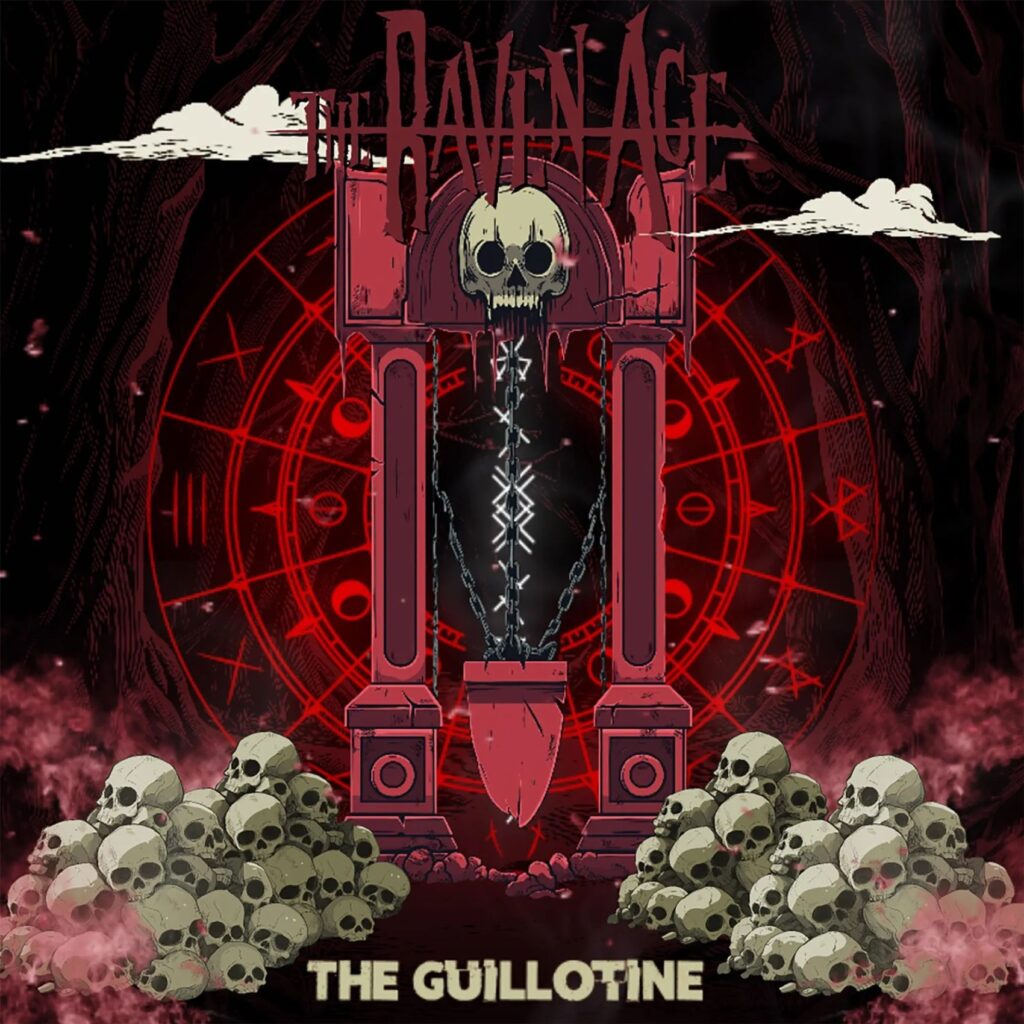
And will that song stay a standalone single, or will it be on the next record?
Well, it’s a difficult one, because we don’t quite know what the next approach is gonna be. The difficult thing is nowadays obviously people don’t really buy albums anymore, which is why it’s quite complicated. So we’re thinking about potentially trying a different format with how we release our music, and that obviously is more based around singles, but sporadically across the coming months, but on a continuous basis, rather than doing it the old-fashioned way and just not release any music for a couple of years, and then release it all in one kind of set piece of time. We’re just gonna try something different, I think, and release music slowly, and drip-feed it, and then put that music collectively into a body of work, like an album, with some other exclusive tracks on it. A lot of bands are doing it that way. Like, Falling Reverse did that. I think for the album they’ve just done, their first single came out in, like, 2017, or something like that. Bring Me The Horizon did it. Yeah, loads of bands are doing it. I feel like with the attention span of the general population at the moment, it’s the way to kind of keep your music current and in the consciousness of your listeners.
But if you’re doing it that way, and not the regular album format right away, will it be hard to find a clear direction, or a clear path for the record then? Because it could be kind of spread out between genres if you’re doing it for, like, forever and ever before you release the album.
Well, it may look that way, but we’ve pretty much got the body of work there already. It may look like we’re just going in and, like, sporadically releasing it, but the body of work is already there, largely anyway, at least for any kind of bigger picture. We’ve always written that way, how it kind of works cohesively over one track to the other. See, I still care about that, you know, when you buy an album, there’s like a flow to the album. Sadly, I’m in the minority, and not a lot of people view it that way anymore, I’m afraid. Which is sad. You know, I was part of the generation that would go to a record shop, and I’d come home, and I would listen to the album from start to finish, and that was my thing. But people just don’t do that anymore, annoyingly.
So, to a little bit of history. Tell me about your first experience of The Raven Age back in the day.
My first experience was actually playing with them with a separate band. So I was in another band for many years called The Wild Lies, and we were doing a festival called Sonisphere Festival. It was a touring one. It was really cool, actually. I don’t think they do it anymore. It was a wicked festival, though. We didn’t have any gigs lined up for it before, so we thought, “Well, let’s do a gig. A pre-Sonisphere kind of show, that we put on ourselves.”. And we needed some other bands, and I think Raven Age got in touch with us when they were brand new, or pretty new, and they said, “Could we play the gig with you guys?”, ‘cause they were doing Sonisphere Festival as well. So they opened the show, I believe, and that’s when I first met George and the guys. It was kind of a very brief meeting, I think. It was one of those. But then we played a few more shows with them, we crossed over at a few festivals, and we jumped on a bit of a tour. So that was when we got to know them a bit better. And then when my band ended about six months later, I had a call from the producer that we both shared. So the guy, Matt Hyde, who did my band The Wild Lies, and Raven Age, said, “Oh, my God. They’re looking for a new singer. You would be perfect.”, and I said, “I don’t think I would. I think I’m very different.”. And he convinced me. He was like, “No, you’ve absolutely got to.”. So he convinced me to speak to the guys. I spoke to Jai first, ‘cause I kind of knew him the best, and he spoke to George. And they’d had loads of auditions, and they pretty much settled on a guy to do the job. So I came in to have a jam with them at the eleventh hour, like really last minute. And it was good, it went really well, and I enjoyed it. Not really expecting anything, but then I got a phone call from the manager Dan (Wright). I can’t remember if it was that night, but it might have been that night when I got home. He called me and he said, “Yeah, we’d love to offer you the job.”. So I was like, “Oh great.”, and I was like, “Oh wow.”. I hadn’t even thought about it, really. It ended up kind of in the deep end. I think that first year we did three major tours. I think we did like a co-headline thing with a band called Savage Messiah, and then we did some shows in Europe with Maiden, and some really cool festivals, and then we did another tour with Tremonti, which was just a really intense first year, but it was great, and then obviously 2019 was even more intense. It was only when Covid happened that I actually took a break from when I first joined.
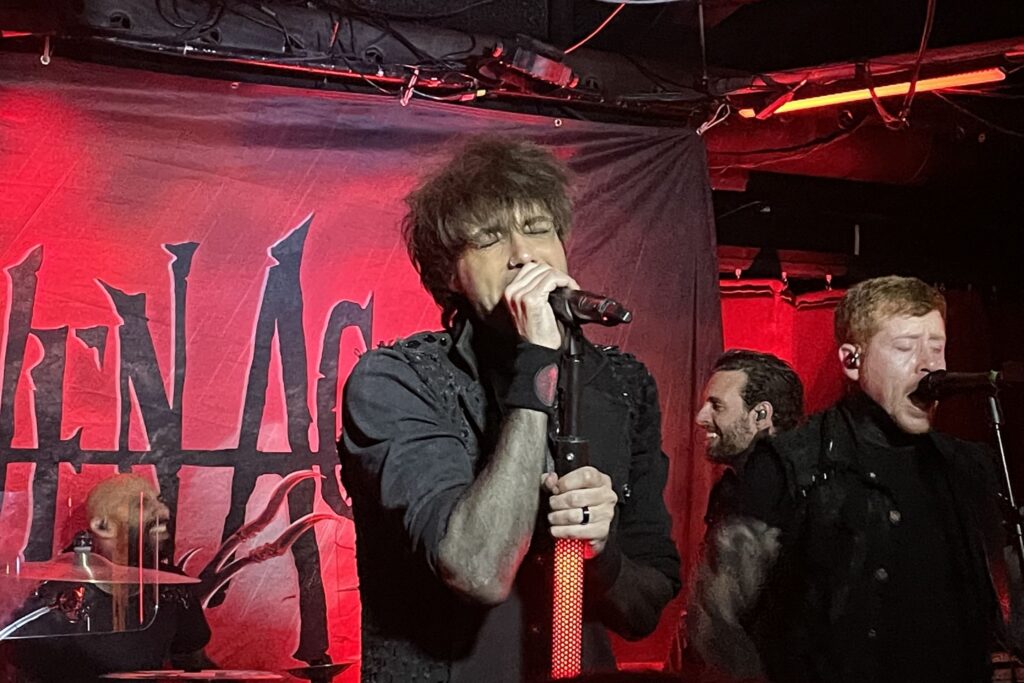
You obviously didn’t sing on the record Darkness Will Rise, but when you sing those songs live now, how do you approach them? In a different way than you approach the other songs?
Yes, I think so. The great thing about George is he’s always very open to new ideas. It’s his band, obviously, but he’s not like, you know, “It’s my way or the highway.”. He’s very open to everybody’s ideas and everyone’s concepts. You know, when that album came out, he was a lot younger. His songwriting approach is very different now, and I think he would have done things a lot differently, like maybe the songs would have been a bit shorter. He always wanted to try different keys, and I think it was more down to that the previous singer (Michael Burrough) just wasn’t able to do certain keys. That was what they had to work with, so that’s what they did. So I think what we did with the Conspiracy album was we just changed the key. And we’re doing some Darkness Will Rise stuff tonight, actually. And when we’ve done things before, like when we did a song called Salem’s Fate, we changed the key, put it up a bit, and we just trimmed the fat, as they say. We did like a slimmed down version of the track, and ironically, it’s one of my favorite tracks to do live, and I wish I could have done it, but that slimmed down version of it. We kind of did a few different versions when we did Exile, the acoustic album. We kind of revisited a few songs, and that was nice to do that, but when we’ve done these songs live, yeah, we’ve just trimmed the fat a little bit, and kind of highlighted the best bits of it.
Pretty much everyone in the band is now around the age where families are built, or have been built. In what way does that work for the band at this point?
It’s very difficult. You know, it’s a challenge, from my perspective especially. I’m not gonna lie. When my son was born, like two weeks later, I was off. We did the Blood Omen tour. So that was difficult, and then I’ve done, you know, two or three tours since then. This being the third or fourth. And it gets harder, I think, every time, the older he’s getting anyway. It is difficult. It is very hard to kind of balance home life. I have a lot of friends at home that are musicians, and touring, and a lot of them are session players. You know, they’ve got older children as well, and I’ve said, “How do you make it work?”, and they’ve said, “It’s just a life choice. You’ve kind of got to do it, and when you’re doing it, not feel guilty, because then your focus isn’t 100 percent in this.”. And then when you’re at home, it’s like, “Oh, I should be out doing something.”. So it’s a catch-22. I don’t know if that’s an answer. But just try to balance it as best you can. My wife is going to come out to Prague with my son.
As you have a family now, and you’re out touring, do you have time to meet your old buddies?
It is hard, you know. I think especially, like, the older you get, you naturally drift. But I have, like, a very secure core group of friends that I try to see as much as possible when we’re around. You know, we try to find time for each other as much as we can, when we can.
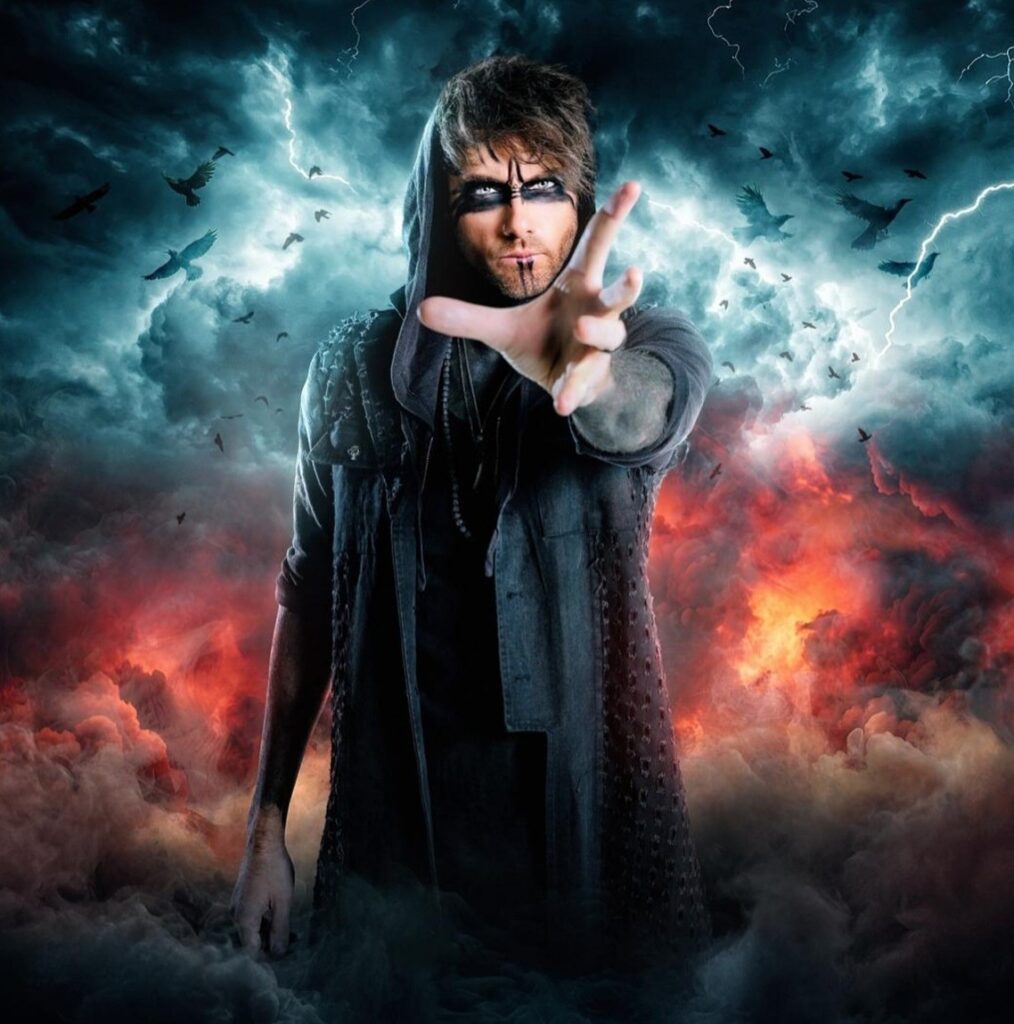
At what age did you realize that you actually could sing?
Oh, oh, good question. I still don’t know if I’ve reached… (Laughs) I’ll tell you what it was initially. When I was in school, I was never very good at sports, I was never very good academically, and I never really had a thing, you know. Like, some people have, like, a thing. There were people that had been picked to be in the local choir, and I wasn’t really paying attention, and they were calling out names, and my name got called up, and I didn’t even know what for, at first. I was just really happy that I was picked for something. It was just really nice, and I got up, and I was like, “Oh, I’ve been picked.”. And I was standing alongside a few other people, and then I realized it was for the choir, so I was like, “Okay, sure, I’ll give that a go.”. And then the music teacher kind of focused more on me, I think, than anyone else. She thought, “Okay, I can do something with him, probably.”. So I had started having singing lessons, like very traditional, classical kind of stuff. It started from there, basically. I did a solo of a Christmas carol in a carol service in a church once, and that was my first, you know, live performance, I suppose. And that’s where it all started. It was only later, when I started getting into, like, rock music, and heavy metal music, and all that, and we started the first bands. No one wanted to sing, so I was like, “Okay, well, I guess I’ll do it.”. You know, initially I really wanted to be a guitar player, but there were always better guitar players than me, so I was like, “Okay, fine.”. So I played bass initially, and I sang in my very, very first band, and this started from there, basically.
I was actually gonna ask about what you dreamt about when you were younger, becoming a singer or a guitar player.
I mean, I’ve always been a singer, I think. I’ve always been doing it, because, yeah, you should just stick to your strengths, I suppose. But no, initially I really wanted to be a guitar player. I really did. And I practiced really hard. I played with a lot of, like, tutors. But yeah, I was always around very good guitar players. I’ve always grown up in bands with just really good, solid guitar players. The first guy I was in a proper band with, still, unto this day, just one of my favorite guitar players. He was a great singer, great songwriter, and we’re still good mates now. And then, obviously, going on through the years, I’ve worked with other people. And now, working with Tommy from Raven Age. He was always the guy that I wanted. I was like, “There’s no one else.”. We, like, auditioned a few other people, and I was like, “You know what? There’s one guy that we need, and we need to convince him.”. So we got him drunk, and he’s been regretting it ever since. (Laughs)
By Tobbe – Published March 14th, 2025
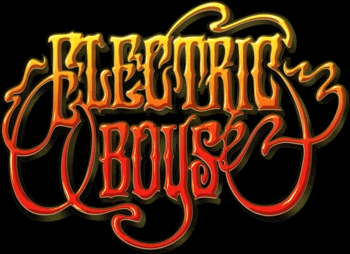
Metal Covenant träffade sångaren och gitarristen Conny Bloom från Electric Boys på ett café i Stockholm förra veckan för att prata om kommande musik, historia och för att få höra några ord från honom om bandets åtta studioplattor samt om nuvarande och tidigare medlemmar.
Börjar det bli lite dags nu för en ny platta från Electric Boys?
Ja, jag håller med. Vi släppte den förra i slutet på ’23. Så det är egentligen inte så lång tid. Det är ju ofta ett par år mellan plattorna, för oss alltså. Men då har vi annat och jag har målat ganska mycket och varit med på Affordable Art Fair, en utställning, så då var det ganska mycket runt det. Och sedan har jag inte riktigt haft någon feeling för vad vi ska göra heller riktigt. Det brukar alltid vara någonting som kickar igång det, att man får någon sådan här inspiration från någonstans. Men den har liksom inte riktigt kommit än, även om jag har en massa tankar och vill snacka om grejer. Fast jag känner att det är dags snart.
Sedan ska det ju skrivas låtar lite mer intensivt, det ska spelas in, och sedan sex månader till med promotion och så efter att plattan är klar, och då är man ju uppe på ett år ganska snabbt.
Men det som händer oftast är att jag ändå samlar på mig titlar, lite riff och spelar in lite röstmemon och det. Det är inte så, om vi säger ”Okej. Ska vi spela in en platta?”, att vi då startar från scratch, utan då blir det att jag bläddrar igenom idéer liksom och tar tag i dem.
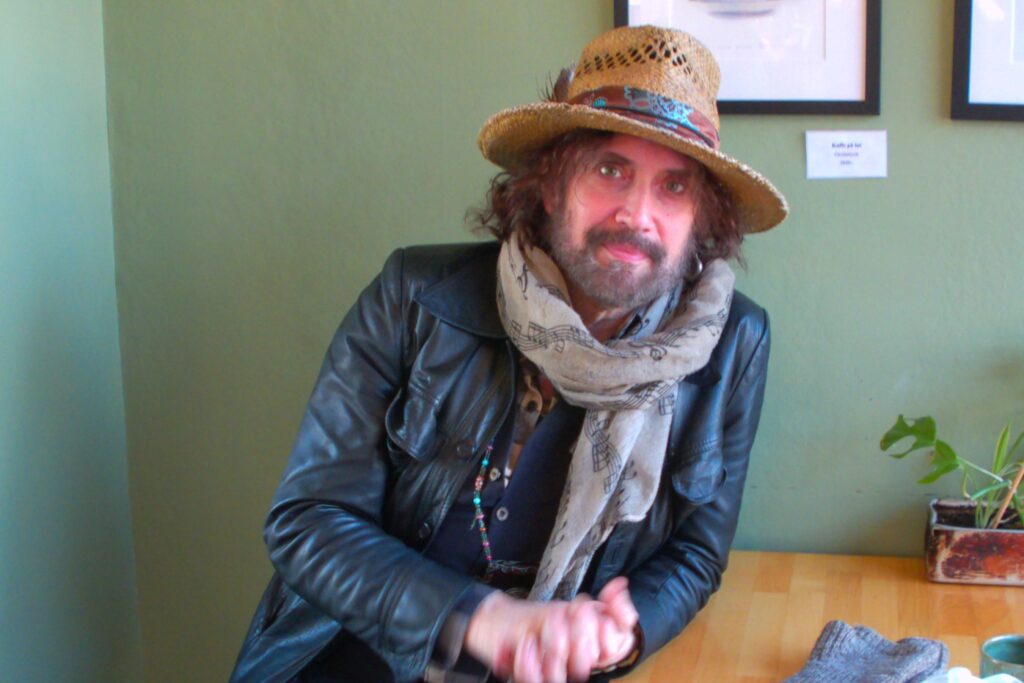
Men sedan när du börjar med det där och tittar igenom idéerna, hur skriver du då dina flesta låtar? Är det på gitarr du börjar?
Ja, eller en textrad. Liksom, en text kan det också vara, och det började nog egentligen när jag skrev lite låtar med Ginger från Wildhearts. Vi hade ju ett band som hette Silver Ginger 5 och då skrev vi några låtar, och då hade vi några titlar först, More Is The Law, Walk Like A Motherfucker och så där, och då var det liksom så här ”Okej. Om det är refrängen, hur skulle man sjunga det då? Vad skulle man ha för riff då?”. Så då liksom började det i den änden. Men ofta kan det också vara att det börjar med ett riff. Något av dem brukar det vara.
Och sedan när du har starten, hur bygger du då vidare? Tänker du vers? Tänker du refräng? Tänker du melodi?
Då sitter man och spelar och sjunger och förhoppningsvis hittar något bara liksom. De bra grejerna kommer ju ganska automatiskt faktiskt, även om man kan säga att man jobbar fram grejerna. Men nästan alltid de låtar som blir singlar och de som folk står och sjunger med i på spelningarna, de typ bara kommer, ofta alltså, har det visat sig. Och så går det så här, som nu, långa perioder när man inte skriver. När jag var yngre så tänkte jag så här ”Shit. Tänk om jag aldrig kan skriva en låt igen.”. Men nu har jag lärt mig att det kommer jag kunna, men bara det att det tar de där perioderna. Det är precis som att man går och samlar på sig intryck, och sedan sätter man sig, och sedan så är det någon idé som kickar igång det och sedan har man bara ”Boom” skrivit ner en platta, eller två plattor till. (Skrattar) Det är som att man måste ha den där perioden, tror jag. Samla idéer typ.
Jag tror att det är olika. Det är väl individuellt hur man arbetar.
Det är ju många som liksom går till jobbet och skriver låtar. Men jag tycker inte det blir bra. Då känner jag att om man ska tvinga fram någonting, då blir det inte lika bra. Det kanske är slöhet också lite grann, att lita på att det ska komma något bara helt plötsligt.
Alltså, det är ju ganska svårt att säga att du gör fel. Det har ju funkat hittills. Det finns väl inget rätt eller fel liksom.
Det skulle kunna gå lite fortare liksom mellan varven kanske.
Men ändå, om det går för fort, då mättar man ju kanske marknaden eller någonting. Pratar ni om sådant också?
Med spelningar, ja. Men att släppa skivor, det tror jag inte. Det kommer aldrig kunna bli för fort liksom. Det tar så pass lång tid att skriva, spela in och mixa, som du sa, så även om man skulle ligga på som fan så skulle det ju inte bli mer än en platta om året. Som det var på 70-talet. Då kunde ju band släppa två plattor.
Jag fattar inte hur det gick till. Eller jag fattar ju egentligen, men.
Ja, det var lite enklare produktioner också. Det var inte en massa pålägg. Och sedan ofta, tror jag, då kanske det var en sångare som var så här specialiserad och var liksom 100 procent bra på det. Och sedan en gitarrist som var 100 procent bra på det. Alla gjorde sin grej. Det går snabbare då, tänker jag. Och att det håller hög nivå. Jag sitter på flera stolar och det känns som att det går lite sakta på grund av det. Till exempel i studion: jag vill ju inte sjunga när jag ska lägga gitarr. Då vill jag liksom fokusera på gitarren och så får man lägga sången efteråt. Och då kan det ju vara, om man har otur, så kanske ”Ja, nu ska vi sjunga.” och ”Fast nu är jag förkyld. Nu får vi göra något annat.”. Så det är ju sådana grejer som kan ställa till det också. Men jag menar, både i det här bandet som jag har, Medborgarna… Och vi spelade in med Peace Conspiracy, där Meja sjunger. Där var det Meja på sång, och så Janne Åström då som sjunger i Medborgarna, och där kan jag bara fokusera på gitarren och resten av bandet bara fokusera på sina instrument. Då går det ju snabbt. Alltså, med de banden skulle jag kunna spela in två plattor om året. Men inte med Electric Boys. Det tar längre tid liksom.
Känner du ofta att du behöver några sidogig från Electric Boys?
Ja, men jag älskar ju att bara spela gitarr. Jag är ju gitarrist från början. Men så har man alltid sjungit. Från början för att det inte var någon annan som sjöng. Jag ser ju mig fortfarande inte som en sång-sångare. Alltså, jag kan inte hoppa in i Aerosmith eller något. Men jag skulle kunna hoppa in där och spela gitarr. Så det kommer alltid ligga före och vara min prio liksom. Det var ju samma med Hanoi Rocks också, och Michael (Monroe), som inte bara är en skicklig sångare, men som är en sådan jävla entertainer också. Det är ju värsta lyxen, att bara låta honom dra det och så kan jag bara helt gå in i gitarrliret liksom. Jag älskar ju att kunna göra det. Nämen, det är berikande att göra lite olika grejer. Då spelar man och gör något annat och då längtar man tillbaka till det andra sedan. Och plus att jag mår ju inte bra när det stannar liksom. Jag vill helst vara ute och spela, i princip jämt.
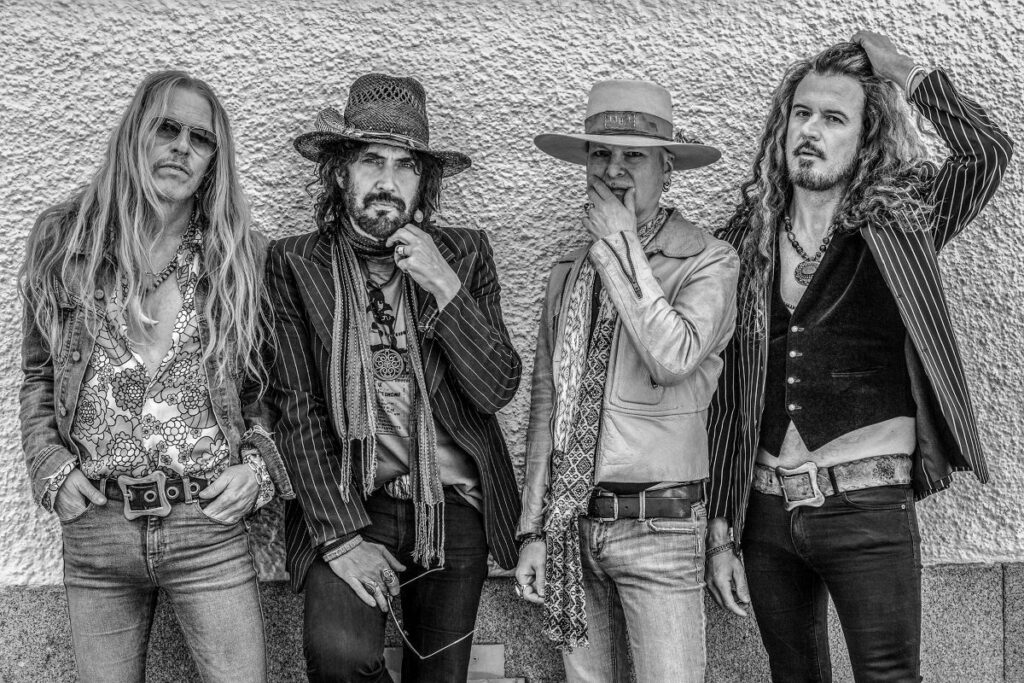
Men var kommer målandet in i den här biten då? Som avslappning eller som något annat?
Jag har ju alltid ritat och så där, och jag designade Electric Boys-loggan och så. Och det var ju teckning och musik som jag var bra på i plugget. Sedan har jag gjort sådana grejer när det har behövts. Jag har gjort lite teckningar till videor och lite sådana grejer. Och sedan var det min polare som ringde en lördag förmiddag och sa ”Häng på till Gamla Stan. Det ska vara en målarkurs.”. Hon är skitcool. Hon är asgrym liksom och ”Häng på.” och så sa jag bara ja innan jag ens hann tänka på vad vi skulle göra. Så drog jag dit och så var jag där och målade lördag och söndag. Galleri Diva heter det, för övrigt; Emilia (Lindberg). Och då fick jag en nytändning, för hon började komma med en massa idéer, och så blev jag pushad också, att ”Fan, det här är ju grymt.”. Och så var det hon som sa så här ”Vi ska vara med på Affordable Art Fair igen. Vi borde skicka in dina tavlor och se om du kan vara med.”. I deras liksom monter där. Och, ja, så godkände de det, så att då var jag med på det. Så det är liksom första gången som jag är med på någon sådan där grej. Så då blev det lite mer på allvar. Jag har liksom mest målat för… Nej, det har ju varit allvar eftersom det har ju varit som jobb. Men jag har inte sett det som ett jobb, om man säger så. Ja, och sedan, som sagt, mår man ju bra av att göra det. Skingra tankarna lite. Jag ska ha vernissage nästa månad och sätta ut lite av det.
Det är så inte jäkla långt ifrån att måla och att göra musik, även fast man kanske kan tycka att det är två helt olika saker. Det är bara olika konstformer.
Jag tycker de är väldigt lika faktiskt. Och så här rent tekniskt, hur man lägger upp det och så ska man ha utställning eller någonting. Man kan liksom dra så här parallellt med att skriva låtar och släppa skiva. Det är väldigt lika.
När du och Thomander lirar in. Ta den senaste skivan till exempel. Spelar ni era respektive delar, om man säger så, som ni skulle spela live? Eller lägger du som är med mer i processen mer gitarr än honom?
Som med senaste plattan, alla spelar ju alltid in samtidigt. Franco, som var med förut, han gillar väl att lägga sin gitarr efteråt. Men jag gör inte det. Jag tycker att jag spelar bättre när jag är i samma rum och känner och ser trummisen liksom. Plus att jag gillar inte att lämna det. Det blir för mycket beslut att ta sedan istället för att bara ”Ja, det där var bra.” och så släpper man det och kan gå vidare. Nämen, vi körde en gitarr i varsin högtalare samtidigt. Och sedan om någon gör något superfel så reparerar man bara just det efter liksom. Och sedan solon är ju lite mer så här ”Jamen, där passar jag. Det gör jag.” och då blir det som ett pålägg. Men många solon är också i grunden för att det passar att komma liksom på sidan ur den ena högtalaren istället för som traditionellt i mitten.
Men har du spelat in skivor, oavsett om det är med Electric Boys eller andra band, där man sitter på varsin kammare och spelar in saker?
Jag har ju lagt pålägg så. Och på Electric Boys-grejer om man ska lägga på någon ren gitarr på något eller kanske något solo eller någonting, då kan jag ha gjort det typ hemma. Men då är det ju mest som ett pålägg. Det är helt okej tycker jag ändå, för då sitter man med hörlurar och så har man bra sound och så får man feeling för att det är kul att sitta och lira. Och även sång och så där. Nämen, så det händer, men då är det ju mer om det är något pålägg, eller om någon vill, så här ”Kan inte du lägga ett solo på den här låten?”. Då får man liksom det skickat och så gör man det. Men annars så vill man ju vara i en studio med ett rum så mycket det går med hela bandet.
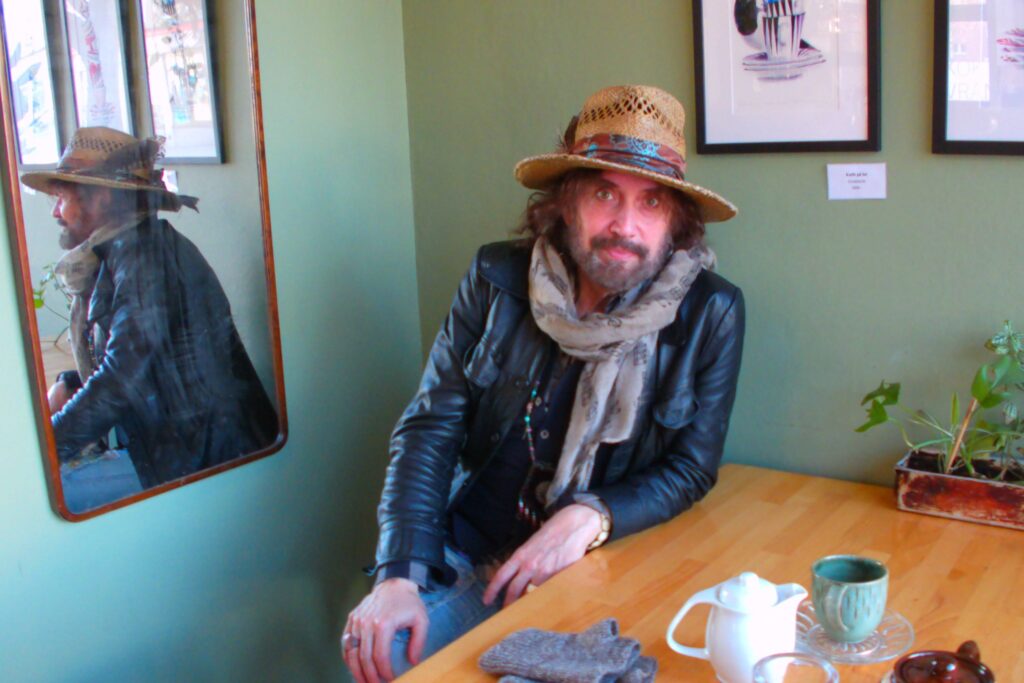
Fem Electric Boys-skivor sedan 2011 har det blivit efter återföreningen 2009. Vad kan det betyda för dig att släppa en ny Electric Boys-skiva igen?
Men för mig betyder det ju mycket eftersom det är en kontinuitet i det liksom. Som sagt, att det hela tiden måste hålla på. Och sedan, alltså som den förra, vi fick ju så jäkla bra recensioner. Och vårt skivbolag har varit bra med sin promotionsavdelning och verkligen skickat ut runt om i världen och fått massor av både intervjuer och recensioner. Men det har ju varit väldigt mycket 4:or och 5:or, och folk har sagt flera gånger att det är typ bästa sedan Groovus Maximus och sådana där grejer. På något sätt så inbillar man sig ju då att ”Fan vad bra. Det här kommer ju ge ringar på vattnet.”, men vi märker inte av några sådana ringar i dagens sorl, eller vad man ska säga. Om man gör skivor som folk tycker att det är bland det bästa man har gjort och ändå märker man inte att man får fler följare, eller liksom att det händer något mer rejält, då blir man ju ännu mer så här ”Men va fan, då kan man ju verkligen bara göra musik som man själv älskar och skita i vad folk tycker.”. Alltså, vi har lite varit så jämt, men man blir nästan så ännu mer, för det liksom spelar ju ändå ingen roll. Det låter tråkigt att säga så, men alltså, förr var det så lätt när man började. Alltså, på så sätt att man hade en låt som All Lips N’ Hips eller någonting, då visste man att om MTV tar upp den, då kommer det hända grejer, för alla kollar MTV, om de gillar rock liksom. Och alla de här rockprogrammen som var på TV. Det fanns ju många. Vi var ju med och gjorde intervjuer och spelade mycket liksom. Så nu är allt så upp i luften. Och plus all jävla politik och det. Hur ska folk få tid att ens bry sig om det? Var ska de hitta det liksom? Det är sådant jävla kaos. Det kommer ju fram folk fortfarande till mig på gatorna, som är typ i vår ålder någonstans, som säger ”Ursäkta. Är det Conny Bloom? Jag måste bara säga. Fy fan vad jag gillade Electric Boys. När ska ni köra då?” och jag bara ”Vi återförenades 2009 och har släppt fem plattor.”, och de vet inte om det. Jag bara ”Men hur fan är det ens möjligt?”. Och då kan den personen ha stått och verkligen sagt ”Fan, jag hade ju affischer med er på väggarna hemma.”. Så det är inget skitsnack, utan ”Okej. Det här är ett fan, och han vet inte om det.”. Men jag menar, jag vet ju lite varför. Alltså, vi har ju inte varit med i Mello, till exempel. Vi har inte gjort de där grejerna som når ut till gemene man. Så är man inte aktiv på Facebook, eller googlar upp saker, vilket många inte är, utan de har sitt kneg, kommer hem, och det är fru och barn, eller man och barn, och sedan är det bara full cirkus där liksom. Och så sätter de på radion kanske i bilen, eller vad fan som helst. Så jag fattar att det kan ramla mellan stolarna. Men det är ju frustrerande.
Jag kommer ihåg när jag hade köpt er första skiva. Då var jag ung. Jag hade väl hört en låt. Jag tror det var Psychedelic Eyes jag hade hört. Det är ju första låten på plattan.
Det var ju annorlunda just då, och vi visste ju att det var det, så vi trodde ju inte ens att det skulle funka i Sverige. Vi var ju helt inne på ”Vi måste göra klart plattan fort och så måste vi dra till Amerika och fixa management.”. Alla svenska band, ja, vad fan hette de? Ubangi, med Orup. Liksom, den typen av pop. Och alla sjöng ju på svenska. Och så fanns det ju några andra. Jamen, typ Europe. Men det var ju inte sådant som vi lyssnade på heller liksom. Vi stod ju närmare typ Aerosmith eller någonting i stilen, så det kändes som ”Äh, fan. Det här är ju helt off för det här landet. Vi måste dra.”. Men då visade det ju sig, med facit i hand sedan, att det var rätt timing istället, så folk bara ”Åh, äntligen ett band som…”. Men vi trodde inte det. Vi blev ju liksom typ förvånade. Vi visste att vi var grymma, men vi trodde att vi måste breaka det i typ Amerika eller något först, och sedan kommer svenskarna att tycka att det är bra.
Ni släppte tre plattor på fem år där i början och sedan har ni släppt fem plattor efter ni återförenades. Du sa att det var lite frustrerande, men är det inte också jäkligt märkligt att man ändå definieras av kanske sina två första skivor när man har gjort många fler skivor i nutid?
Ja, men jag hakar inte upp mig på det så mycket. Det känns som att ”Vad fan ska jag göra?”. Jag menar, de som vet vet. Jag kan inte liksom tvinga det på folk, eller vad jag ska säga. Och igen, det handlar ju väldigt mycket om hur man själv ska liksom må bra och gå vidare och känna att vi utvecklas och gör bra grejer. Jag tycker vi gör det hela tiden. Jag tycker inte vi släpper dåliga skivor. Och det är alltid några låtar som är så här ”A ja, den var lite annorlunda. Den fanns inte på förra plattan.”. Vi har inte så strama liksom tyglar så. Jag tror vi tänkte mer så från början, men sedan visade det sig att när man har testat och gjort grejer som har varit lite mer udda, någon zigenarvals på någon platta och allt vad det var, och vi väl har spelat in det med samma ljud, min röst, gitarrliret och det där, då hamnar det ändå där så att det liksom hör ihop och blir någon röd tråd. Nej, det är bara att fortsätta och försöka göra låtar av det som inspirerar mig själv först och främst.
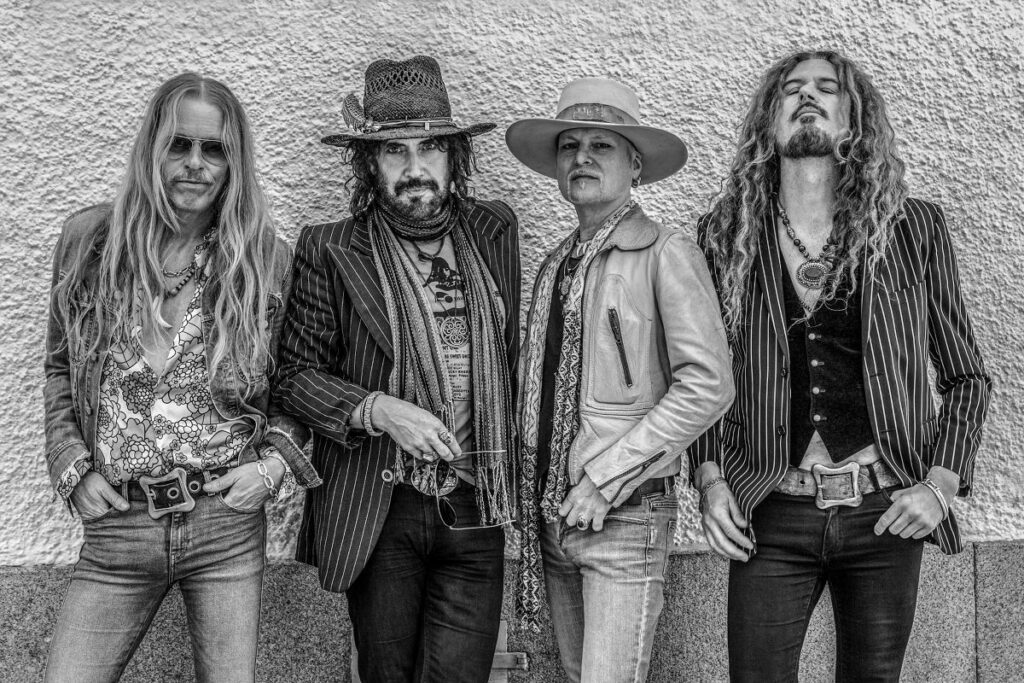
På tredje plattan, Freewheelin’, då var det ju bara du och Ankan kvar i bandet. Vad var det som hände då egentligen? Ni var ju ändå fortfarande ganska populära även efter Groovus, måste jag säga, även fast första skivan kanske höjde er till att börja med.
Först och främst så knakade det i bandet, så vi gick ju skilda vägar med Franco där. Och så tog vi en fika en dag med Niclas och så kände jag så här ”Jag måste liksom vara hård med honom.”, för jag tyckte att det kändes inte som att han brydde sig längre. Jag sa ”Vill du det här eller vill du inte det här?” och då sa han ”Jag hajar vad du säger, men jag måste få tänka lite i en vecka eller två, så vi kan väl ses igen om någon vecka.”. Ja, då gjorde vi det och då sa han ”Nämen, jag hoppar av. Fan, som du sa, jag har inte någon direkt lust.”. Han var egentligen aldrig någon sådan här snubbe som ville bo på hotell. Han gillade att vara hemma, gå ut med hunden och meka med hojen. Lite så här John Bonham, även i sättet liksom. Så bara all respekt. Man ska inte tvingas att vara med. Så då bytte vi ju två medlemmar, och då var det ju kul för då blev det ju nytt blod. Och så blev ju den plattan lite mer 70-talshårdrock. Jag vet att vi lyssnade mycket på Captain Beyond och liksom sådant. Eller det har man ju alltid gjort, men vi fyra hade andra gemensamma nämnare som kom upp när man satt och drack bärs och lyssnade på musik, och så bara ”Fan vad bra det här är.”. Det formade väl plattan lite också. Jag tycker den blev skitbra. Men sedan när väl plattan var klar, så bara ”Okej. Vad händer nu då?”, liksom till skivbolaget och de sa ”Nämen, vi har inga pengar till promotion.” och vi bara ”Va? Har ni inga pengar till promotion? Ni har ju fan slösat…”, ja, hur mycket det nu var. Vi var ju i Abbey Road och spelade in och så där, ”Ni måste ju ha planerat in för fan att ni ska göra promotion för skivan sedan.”, men ”Nä, jag kan inte gå till min boss och be om mer pengar.”. Och då gick ju liksom luften ur mig igen efter att det hade varit så här uppförsbacke med medlemsbyten och sådana där grejer. Man hade ju kunnat traggla på, men jag tappade bara feelingen. Jag bara ”Jag kan inte skriva en bra platta nu, känner jag. Jag måste göra något annat.”. Sedan lade vi ner bandet och så gjorde jag ju Psychonaut, soloplattan. Så det behövdes. Man ska inte bara fortsätta om man känner att det inte blir bra.
Om det hade varit idag, tror du att du hade tragglat vidare då, eller hade det varit samma tankar idag, 30 år senare liksom?
Svårt att säga. Alltså, man ändras ju. Allt ändras ju, så det är svårt att säga faktiskt. Men hade jag känt att ”Nej, jag kan inte skriva en bra platta.”, då hade jag väl tänkt likadant. Det tror jag. Det är det som måste vara drivkraften, att det blir bra liksom. Men jag kanske hade sagt ”Okej. Vi tar ett break. Vi pausar det här ett år.”. Det hade jag nog sagt idag. Och så får man se om man får feeling igen liksom, istället för att vara så där definitiv. Men det kanske behövdes. Det hade varit jävligt intensivt, så man kanske bara ”Okej. Fuck it.”. Det är skönt att bara stänga dörren till saker också.
När ni körde med H.E.A.T nyligen så lirade ni åtta låtar och då var det tre från första plattan, och när man kollar någon spelning från förra året så körde ni 13 låtar och då var det fem låtar från första plattan. När ni väljer att spela ganska mycket från första skivan, gör ni det för att publiken vill höra det, eller är det så att ni själva tycker att den plattan är bäst och vill lägga en dryg tredjedel av materialet just från den?
Inte för att vi själva tycker den är bäst, tror jag, utan mer för att vi vet att det är låtar som folk gillar. Men det är lite svårt att välja ett set om man ska hålla sig till 45 minuter. Det är det faktiskt. Man vill få med olika typer av grejer. Man vill få med lite allsång, man vill få med singlar, man vill få med låtar där det finns plats att jamma. Så det är många olika grejer som man vill knacka in där. Men jag tycker att vi fick ihop det ganska bra. Vi utgick nu från typ det setet som vi hade gjort när vi var ute och spelade senast, så att vi kände liksom att ”Det här sitter i ryggen nu.”. Så vi fick ta bort lite låtar och så ändrades lite smågrejer. Men det kändes ändå skönt att vi inte chansade liksom. Och speciellt när det är så här bråttom ibland, när det är två band och det kanske blir lite stökigt runt soundcheck. Det sista man vill hålla på och tänka på då är ju ”Hur fan går låtarna?”. Det ska bara vara klart så man kan koncentrera sig på de här tekniska problemen. Vårt hopp var ju att spela för många nya möjliga fans liksom, att H.E.A.T skulle dra en stor publik som inte brukar gå på våra gig. Så då kände vi ”Då spelar det ju ingen roll om vi spelar ungefär samma set som vi gjorde senast vi var ute på vår egen turné.”. Men det känns som att det var många nya tittare och lyssnare. Alltså, folk kom fram efteråt, ”Shit. Jag hade ingen koll på er. Det här var ju grymt.”. Det var det som var tanken liksom, att få spela för lite ny publik. Vi skulle ju vilja spela mer nytt, men det känns viktigt att få med folk liksom och då har vi flera sådana låtar. Men det är lite svårt på 45 minuter. Jag tycker en timme och en kvart är ganska perfekt. Vi pratade om det nyligen. Och det sa även H.E.A.T faktiskt. Nä, en och tjugo ungefär, skulle jag säga. Då har man liksom tömt sig och man har fått lira loss och publiken har varit med. Sedan är det lagom att gå och hämta en kall öl. Sedan beror det ju på hur mycket folk har betalat. Om man betalar mycket för ett band på Globen, då förväntar sig ju folk att det ska hållas på länge liksom. Kanske inte tre timmar, som vissa band. Det är jävligt få gånger man liksom står och har intresset uppe i tre timmar, i alla fall jag.
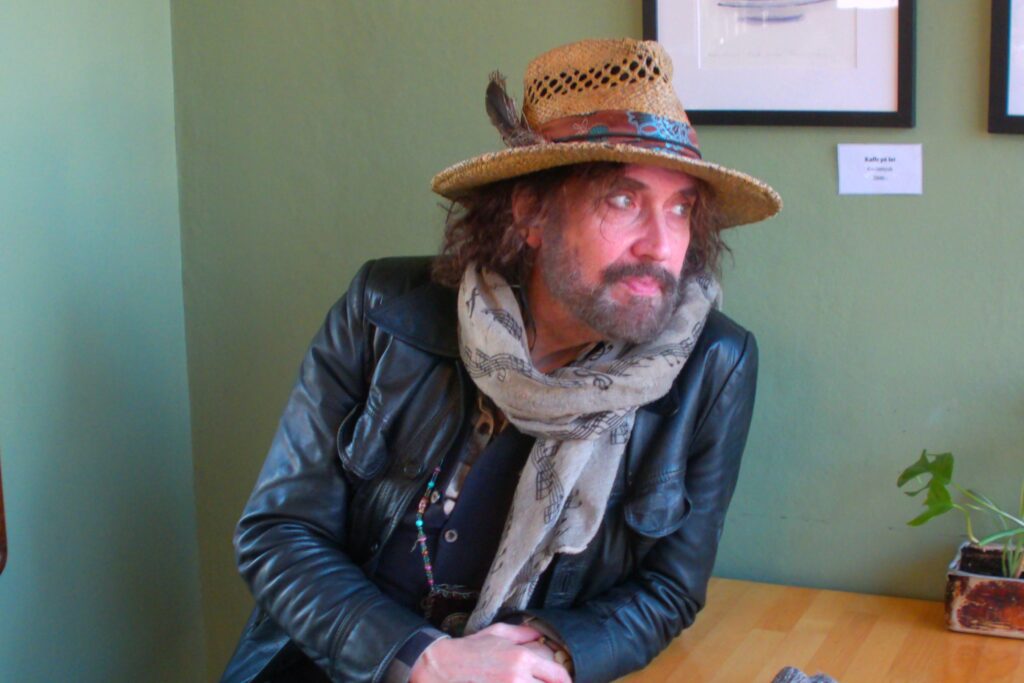
Jag tänkte att vi snabbt ska gå igenom era åtta plattor och att du kortfattat ska säga det första du tänker på. Vi börjar väl på första plattan Funk-O-Metal Carpet Ride. Du får välja första versionen eller USA-versionen, eller båda tillsammans. Vad kommer du att tänka på först?
Det första jag tänker är att det var otroligt jävla kul att spela in. Den första, svenska, och sedan var det ju då att vi fick möjligheten att spela in den andra med Bob Rock. Men det är samma platta lik förbannat. Det var ju bara det att vi bytte ut lite låtar. Men han var ju störst. Så det är ju också ett jävla kul minne. Det är det jag tänker, att det var jävligt kul och inspirerande att spela in. Och den plattan hade man ju också haft låtarna till lite längre då. De var ganska genomarbetade och inrepade liksom.
Då hoppar vi till andra plattan, Groovus Maximus.
Det tog lite för lång tid att göra den, vilket var synd. Vi fick ju en sådan där hype i Staterna efter All Lips N’ Hips och då hade det varit bra att gå rakt på direkt. Men det tog ju två år eller någonting. Ja, det var att man satte ribban så högt, så det var så här ”Nä, vi släpper inga skivor innan vi tycker att det är grymt.”. Så det tog lite tid. Men den tycker jag är skitbra. Jag tycker min sång hade blivit bättre på den. Och så spelade vi in i Abbey Road och det var coolt.
Du berättade lite om Freewheelin’ nyss, men du får säga någonting om den igen då.
Då var vi tillbaka till Abbey Road igen, med lite nytt folk, vilket var en nytändning också. Och den plattan blev lite hårdare. Mer hårdrock, mindre funk, och det var nog lite med flit faktiskt, för att det var ganska många band som hade börjat köra med liksom funkgrejer och då kändes det inte så kul längre helt enkelt. Så då tänkte vi att då kan vi lika bra vara mer basic och börja köra mer tunga riff typ, eller riffrock liksom.
Mellanfråga. Blev ni påverkade av grungen där någonting till Freewheelin’?
Nej, men alla säger det. Men vi blev inte det, för vi var så mycket inne i vår bubbla ändå. Likaväl som att vi inte var påverkade av liksom alla spandexbanden på 80-talet. Man väljer ju vad man vill lyssna på. Vi var mer old school. Ja, bortsett från vissa, som Van Halen och så där. Det var ju för bra för att undvika liksom. Men annars så var det ju: Niclas älskar ju Zeppelin och vi lyssnade på Mother’s Finest och Sabbath. Äldre grejer liksom.
Alltså, det är ju ingen grunge-platta inte. Det var bara mer att jag tänkte om det fanns en påverkan på att ni behövde göra något annat.
Folk sa ju sedan att det var väl det som satte spiken i kistan. Och det kanske det var, för att branschen påverkades. Men det påverkade liksom inte oss i bandet, förrän då när skivbolaget skulle släppa plattan och sa ”Vi har inga pengar.”. Det påverkade oss.
Vilken jävla chock, eller hur?
Ja, jag blev så förbannad så jag höll på att bli vansinnig alltså. Så det blev vi påverkade av. Och hade plattan släppts och gjorts promotion för, och så hade den kanske inte tagits emot, då hade vi kanske känt att ”Nämen, tiderna har ändrats. Nu vill inte folk ha det där, för nu vill de ha det här istället.”. Men vi kom ju aldrig dit.
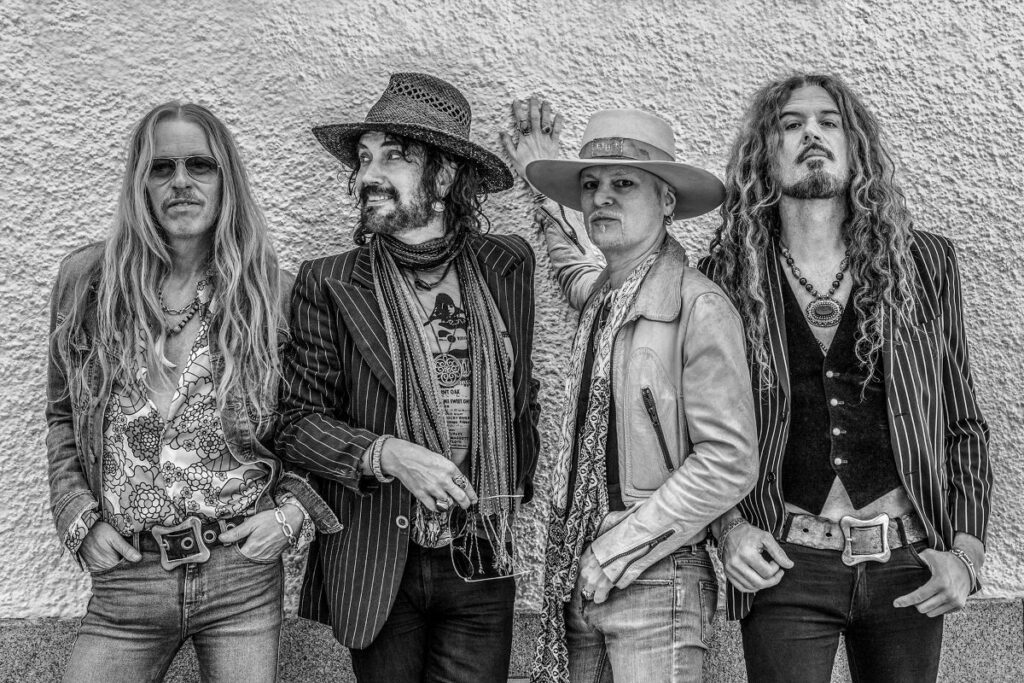
Du, vi hoppar raskt fram till strax efter comebacken. And Them Boys Done Swang. Vad var det första du tänkte på där som comebackplatta?
Att vi tänkte att det är viktigt att man gör en platta som folk kan känna igen liksom. När till exempel Europe återförenades så kommer jag ihåg att jag hörde någon låt som jag liksom inte tyckte lät som Europe. De var mycket tyngre, hårdare, nedstämt och jag bara ”Fan, det här är inte Europe.”. Nu är inte jag något stort fan, men om jag hade varit det, då hade jag nog kanske reagerat och tyckt ”Jamen, det är ju inte det här jag vill ha.”. Nu kanske folk tyckte det, men bara för att dra en parallell. Jag kommer i alla fall ihåg att jag tänkte lite så. Så i vårt fall så var det viktigt att det skulle kännas och låta som oss om vi ändå ska återförenas. Jag tycker att om man lyssnar på den nu så tycker jag att allting går lite för fort. Den är lite stressad, tycker jag, även om det finns bra låtar.
Sedan dröjde det några år till Starflight United.
Starflight United. Den åkte vi bort och spelade in, så vi var i studion där i Sundsvall. Vi slaggade i studion, vilket var kanon. På samma sätt som vi gjorde i Abbey Road. Då blir det bra fokus. Man går upp, käkar frukost tillsammans och så bara in och spelar in direkt liksom. Jag gillar det. Den skivan är ganska välproddad. Alltså, ganska mycket pålägg och fix. Ja, det är ingen så här självklar live-platta på något vis. Vi spelar sällan någonting från den faktiskt. Men det är inte för att jag inte tycker om låtarna. Det är bara att när man har testat så har det inte fäst riktigt på oss.
Ska vi hoppa fram fyra år till 2018 och The Ghost Ward Diaries?
Då var vi i Gröndal med David Castillo. Då bodde ju Niclas i Amerika, så han åkte hem och då kom Jolle, som har varit Niclas ersättare sedan vi återförenades faktiskt. Han har ju spelat liksom jämt, i princip. Niclas har gjort ganska få gig egentligen. Men han är liksom officiellt egentligen med i bandet. Han har inte lämnat det och han har inte fått sparken. Det är bara det att han är i Amerika. Då hade Jolle lirat så mycket så då kändes det liksom taskigt om han inte skulle spela på plattan. Så då spelade de två ganska exakt halva var. Den blev ju bra, tycker jag. Den har vi spelat flera låtar ifrån live. Hangover In Hannover och You Spark My Heart.
Sedan har vi Covid-plattan. Ups!de Down.
Den är ju lite mörkare, tycker jag. Den är inte lika mycket så här partyplatta, just för att man blir inspirerad av allt som händer runt omkring. Texterna blev väl kanske lite allvarligare om allt skitsnack i sociala medier. Det blev så påtagligt alltså, när folk satt hemma och drack öl och blev kaxiga framför datorn och trodde de visste allt och man bara ”Vad fan är det som händer där ute?”. Det blev väl lite djupare på något vis. Och så öppnade vi ju med en instrumentalare där på över sju minuter, vilket var kul, för vi tänkte ”Fuck it. Plattan heter ju Ups!de Down. Det är lika bra att göra det också.”. Och då visade det ju sig att det funkade, för att det var det första alla sa sedan i intervjuer, ”Hur fan tänkte ni? Ni öppnar med en instrumental låt.”. Men de sa också att de tyckte ”Fan vad coolt att ni gör det. Det är ju inga som gör så.”. Så det funkade liksom. Men det är inte enligt normerna. Men det är tråkigt att göra allt enligt normerna. Och den har ju många bra låtar också, tycker jag. Vi har ju spelat en del. I synnerhet efter den hade kommit ut, så körde vi ganska många låtar live, och även den där långa instrumentala.
Och då är det bara en skiva kvar. Grand Explosivos.
Och då åkte vi ju bort igen. Då var vi i Palma och spelade in. Det är nog den jag tycker låter bäst av alla skivor. Jag är jättenöjd med ljudet. Just att det låter liksom naturligt, men ändå modernt, på något konstigt sätt, att det är ett jävla tryck och så där. Men den tycker jag är mycket bra, liksom med låtar, refränger och kul texter och allt möjligt. Det är lite synd att det inte hände mer, igen, så att säga. Men jag vet inte vad man ska göra åt det. Men vi fick i alla fall de där bra recensionerna och det, så det kändes ändå som att den uppskattades liksom av de som tog sig tid och lyssnade.
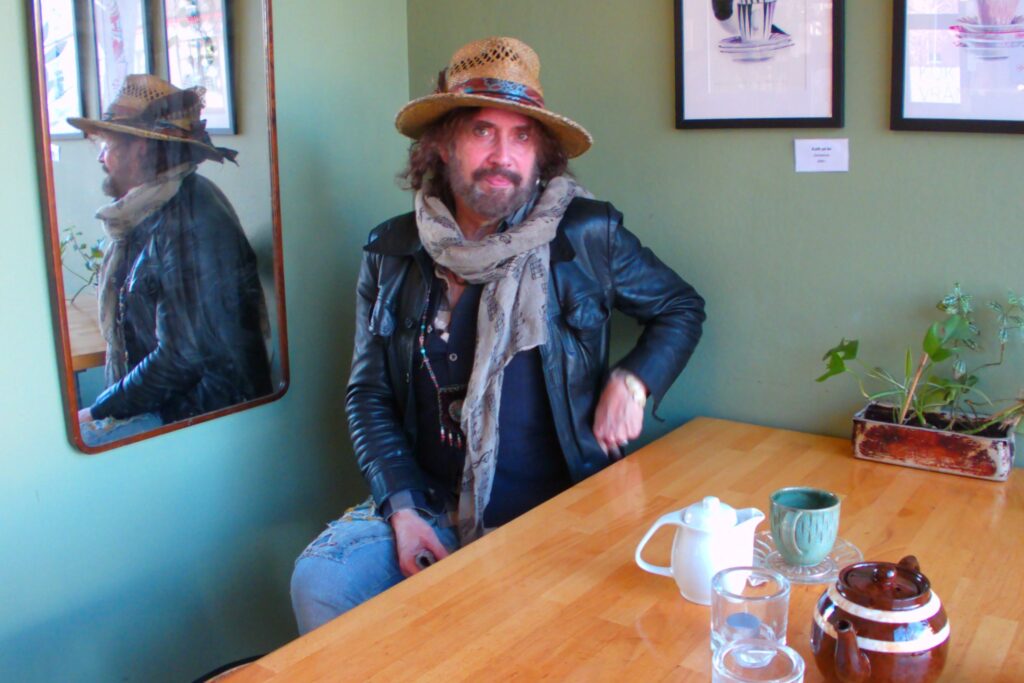
Nu tänkte jag att du skulle få chansen att prata väl om nuvarande och forna bandmedlemmar. Jag drar igenom sex personer och så får du säga något positivt om en i taget. Vi kan börja med Thomander.
Oj, vad svårt. Men jag tycker att vi kompletterar varandra väldigt bra spelmässigt. Vi har väldigt mycket samma förebilder, så vi tänker nog ganska lika, även om vi ändå har olika stilar. Han har ju spelat in sologrejer där han sjunger också, så han ser sig själv som en sångare också. Det funkar bra med sången också, att han liksom tänker sig det som något viktigt, så att säga, som man kanske inte gör om man typ är körsångare. Sedan är vi ju grannar, så det är lättare att gå och ta en fika när man behöver snacka om något.
Då kör vi vidare. Vi kan ta Jolle.
Jolle kom ju med i Hanoi Rocks sista året som vi höll på. Jag och Ankan var ju med i fyra och ett halvt år och Jolle var med sista året. Så det var ju då vi blev liksom polare. Ankan gillade att spela med honom. Jolle var ju liksom ett gammalt fan. Han gillade ju bandet och han gillade Sigevalls trumlir. Han var och såg oss på Marquee ’92 eller något sådant där. Han hade ju det i blodet, så att säga, det vi gjorde. Så när vi återförenades och vi behövde någon som kunde hoppa in för Niclas, då kändes det väldigt naturligt att ta med honom, för han och Ankan hade hittat en bra grej som rytmsektion. De var väloljade efter Hanoi liksom.
Då kör vi Ankan nu.
Ankan startade jag ju bandet med. Vi hade ju lirat ihop innan i olika projekt. Vi lärde känna varandra när vi var 14. Han har alltid varit ett bra bollplank. Vi har liksom spånat och haft kul och snackat mycket musik ihop. Vi var och såg en massa band ihop på 80-talet. Legendariska spelningar faktiskt, som Bob Marley på Grönan och Iron Maiden med Paul Di’Anno och allt möjligt som var kul. Han är ju liksom lite så här brorsan som jag aldrig har haft typ. Sedan är han ju en klippa på bas. Han är en maskin. Man vet var man har honom. Stabil.
Övriga medlemmar och ex-medlemmar: Niclas Sigevall – trummor (1988–1993 och delvis sedan 2009 till idag.) Franco Santunione – gitarr (1988–1993 och 2009–2020.) Thomas Broman – trummor (1993–1994)
Positivt om de som inte är kvar i bandet då. Vi kör Niclas först, även fast han fortfarande halvt är kvar.
Niclas kom ju in och gav en jävla pondus till bandet i början, eftersom han hade sin spelstil, och som person också. Han står ju stadigt på båda benen, vilket jag alltid tyckte var skönt, att jag hade honom i ryggen där bak. Stabil liksom. Han är ju fan trumhjälte för många trummisar faktiskt. Om inte annat för att han slutade typ spela. Alla bara ”Shit. Var är Niclas? Vad gör han?”. Så han blev lite legend på grund av det också, tror jag. Och han är ju fantastisk. Det är en sådan jävla övertygelse i hans spel. Mäktigt faktiskt. Jag hoppas faktiskt att jag får spela mer med honom, på något sätt, vid något tillfälle. Men han bor så jävla långt bort bara. Det blir ju strul.
Och så något positivt om Franco då.
Niclas var den som kom med först, alltså efter mig och Ankan, och han spelade ju med Franco, så då tog jag med honom. Eller vi testade honom för de var polare. Han kom in och var liksom en positiv hippiefigur som bara garvade liksom och var en skön lirare liksom. Och vi kompletterade ju varandra bra. Vi spelade ju väldigt olika. Där var det mer så här tydligt att jag var liksom sologitarrist och så kompade han. Men han gillade ju det också, uppenbarligen. Och så hade han ju sitt liksom fetare Les Paul-ljud och jag min Strata, så vi kompletterade varandra. Och vi höll ju på länge liksom. Det funkade ju kanon. Och sedan på senare år då han inte är med, det var ju för att han också hade en massa andra projekt och vi började tänka lite olika om hur man skulle gå till väga, om inte annat med business runtom bandet. Så det var mer att man hade delade meningar om saker. Men allt är ju coolt. Han har sitt Black Paisley nu.
Han var ju inte med så länge, men Broman, Freewheelin’-trummisen.
Han var ju också en grym jävel. Otroligt bra trummis. Han spelade väldigt olika mot Niclas. Broman har ju en hängig spelstil, liksom tyngre, eller baktung, eller vad jag ska säga. Niclas är mer som att han driver det framåt. Han var sjukt svängig och tajt. Han var en stor del, precis som Thomander, till varför Freewheelin’ lät som den lät liksom. Men sedan hade jag ju bandet med Meja som hette Peace Conspiracy och där var ju Broman med och spelade. Det var kul. Vi höll på rätt mycket 2018. Det var kul att lira med Broman igen. Han är grym.
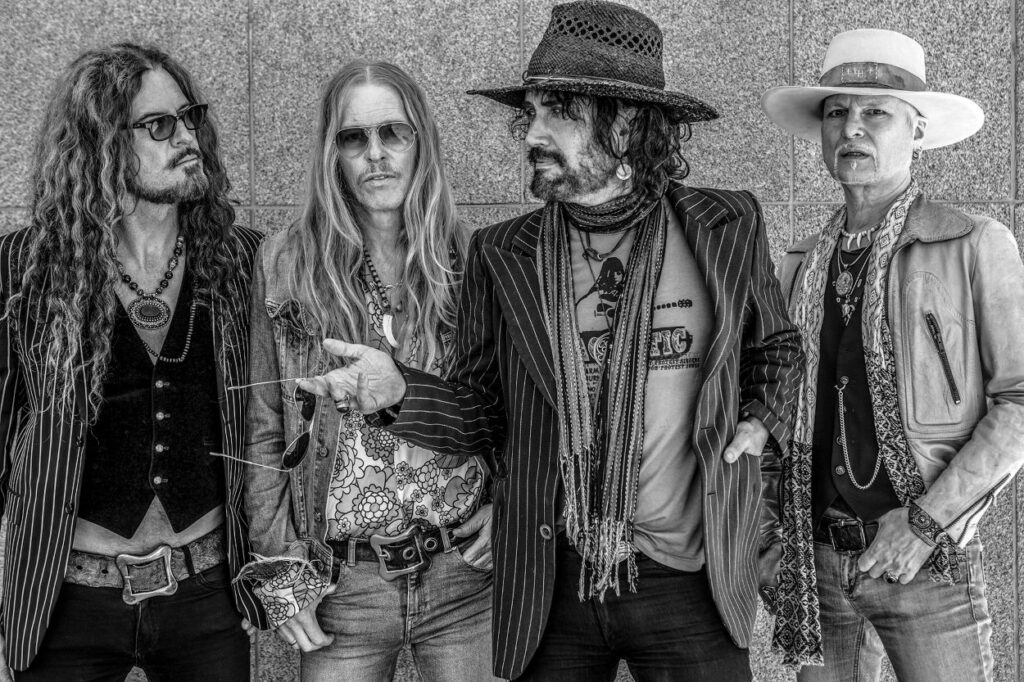
Både du och Ankan fyllde ju 60 förra året. Tänkte du på det överhuvudtaget eller brydde du dig inte?
Det är ju lite konstigt. Det är det ju faktiskt. Men liksom, det är inget man kan sätta stopp på heller. Det är ju bara att tjacka läget. Nämen, man ändras ju. Det är svårt att säga kanske hur man ändras, men man gör ju det. Jag tror jag tänkte liksom ”Shit alltså. Liksom 60. Att jag fortfarande håller på. Att man fortfarande är ute och spelar. Att folk fortfarande kommer och tittar.”. Och det är fortfarande kul. Man brinner för det, lika mycket, skulle jag säga, även om man förut kanske hade mer ett valpigt driv eller tonårsdriv liksom, för att man har det när man är ung. Men det finns ändå drivet att göra det på samma sätt. Det betyder lika mycket. Men det är klart att de där siffrorna är konstiga när man ser och hör dem. Men sedan glömmer man ju det. Allt är samma i alla fall. Man har lite mer ont i lederna, är lite stelare och ser lite sämre. Så är det i livet. Man kan inte göra så mycket.
Vad tror du att åldern, eller kanske mognad, gör med ens musik?
Jag hoppas att det gör att man spelar lite mer med luften, att det inte bara är tonerna som spelar roll. Fast jag har nog alltid varit så. Jag kommer aldrig bli någon sådan där shredder, för jag tycker att det är ganska meningslöst. Det måste betyda något. Det är som att lyssna på någon som står och pratar rätt fort utan att ha något att säga. Eller jag vet inte liksom, men man lyssnar hellre på någon som har något vettigt att säga och som är cool. Jag tycker det är likadant med att spela instrument. Men sedan lär man sig väl lite grejer vartefter och ”Jaha. Kan man skriva en brygga så där? Kan man lägga en sådan kör?”. Men det är svårt att säga. Man kommer väl på nya grejer, förhoppningsvis i alla fall.
Har du funderat på att göra ett soloalbum någon gång igen?
Absolut. Jag har gjort flera stycken. Jag har gjort två svenska och sedan har jag ju gjort den där Psychonaut som kom då efter Electric Boys la av första rundan och den var ju på engelska. Nämen, det tänker jag på ofta, vad jag ska göra för soloplatta liksom. Det ligger ju i pipelinen, både att göra en ny Electric Boys-platta och någonting solo. Vad fan det nu ska bli liksom. Det har inte riktigt landat än. Men det ska jag göra, absolut. Först när jag gjorde den första svenska soloplattan, Fullt Upp, då var det väl lite så att jag tänkte ”Hur ska jag veta vad som ska gå till Electric Boys och vad som ska vara solo?”. Men det blev ganska klart ganska fort vad som skulle bli vad. Så nu tänker jag inte ens så. Det kan säkert dyka upp röstmemon och idéer där jag blir så här ”Vänta. Vad ska jag göra med det här?”. Men det känns som att det visar sig ganska naturligt. Sologrejerna är lite mer bluesigt, rockigt. Electric Boys är lite mer hårdrockssound liksom, typ. Låtarna är lite annorlunda stil tycker jag. Jag tycker sologrejerna står närmare liksom Beatles, Hendrix och Doors och inte är så hårdrockigt. Men jag vet inte. Jag kanske gör en soloplatta på engelska den här gången bara för att jävlas. Jag får ha en sådan här titel som inte avslöjar det, så får det bli en överraskning när man… (Conny visar att han sätter ner stiftet på en LP-skiva.) Men kolla nu då. Är man gammal när man gör så här och ska sätta ner nålen? Ba, 60? (Skrattar)
Av Tobbe – Publicerad 11:e mars 2025